#tis important for tom's growth <3< /div>
Explore tagged Tumblr posts
Text

SwynWriMo Day Two – Family Ties One Shot
Guilt Trip
[cw -- sexual assault mention and discussion about (all vague and nondescript)]
~~ ~~ ~~
Tom didn’t visit with Melody as much as he should.
She never said as much, because of all his sisters, she was always the most gracious of them--but it didn’t matter. He still knew it wasn’t enough. If they saw each other once a week, it was an impressive feat for them. Melody always tried to forgive him with talk about how it was a two way street and she could reach out more. That she was busy, working on her dissertation.
But Tom was her older brother. It was his responsibility to arrange these meetings.
That usually wasn’t how it played out, though.
Melody had reached out, inviting Tom and Levi around to her flat for dinner. As soon as he had gotten the text, he’d felt guilty. Realizing he couldn’t remember the last time that he had seen her. It was getting closer to the holidays, so he was sure that he would see her then.
“Hiya,” Melody said, opening the door and reaching her arms out--for her nephew.
“He’s not going to stay long,” Tom told her, leaning in to give her a side hug after he transferred Levi over. His son was in his running about phase. The terrible twos came in fits and starts for his quiet, pleasant son. But he had been being particularly squirmy the last few months--wanting his independence, not wanting to be close.
Tom was surprised how much it hurt, every time Levi whined no and pushed against Tom when he tried to pick him up.
“Well, he’ll stay just fine with his auntie, aye?” Melody bounced the toddler, who laughed, but pressed his little hand against her chest.
“Good luck,” Tom told her with a snort as he took off his shoes at the door and followed her further into the apartment. It was a nice place, in Castle Suites. Tom had insisted he help her pay for it, because he didn’t want her at Benbow which had a reputation for not being quite as safe. (The reality was the difference was miniscule, but Tom was overprotective. Especially of Melody, the only sister he had left.)
~~ ~~ ~~
[link here]
~~ ~~ ~~
#swynwrimo#swynwrimo2024#swynwrimotina#swynwrimotina2024#self para#guilt trip#featuring melody#this is very long#and KIND OF a cheat#since one person is only mentioned#but i am counting it#bc i wanted to write this anyway#tis important for tom's growth <3
0 notes
Text
My Thoughts on Pride & Prejudice 2005: Style over Substance
Kicking off my Pride and Prejudice adaptation review series with the most popular of all the adaptations: the 2005 movie. This film stars Keira Knightley as Elizabeth Bennet and Matthew Macfadyen as Mr. Darcy.
1. GENERAL THINGS I LIKED
The cinematography and the soundtrack. Every shot is a painting, especially with the gorgeous landscape scenery. The music is beautiful and dreamy; I have listened to the soundtrack more times than I've watched the film. Both the cinematography and the soundtrack effectively transport the viewer back to the film's romanticized version of "the past," when life was simpler and people lived slower lives, waiting for their Mr. Darcy to sweep them off their feet.
Originality. The film takes a unique approach to the story by focusing mainly on the romance between Darcy and Elizabeth and emphasizing how the natural surroundings reflect the characters' mental state/emotions (pouring rain during the first proposal and stormy skies when Elizabeth hurries home after Lydia runs away). Though one can disagree with the creative changes made, I like how this film isn't just a remake of what came before it.
Elizabeth's walks through the countryside. The film expresses her desire for freedom through her countryside walks. For instance, the Netherfield walk is shocking to Caroline Bingley because it demonstrates Elizabeth's independence.
The comedic parts are great thanks to the creative additions made. For example, the "excellent boiled potatoes" joke isn't in the book, but it perfectly exemplifies Mr. Collins' poor social skills and pretentiousness, as he tries to make an overly formal comment about an otherwise mundane dish.
2. THE CASTING
The acting is good, although I don't always agree with how the characters are portrayed.
Keira Knightley. I like how she's the right age for Elizabeth, who is around 20-21 years old; Knightley was around 19-20 when she played Elizabeth, plus she has gorgeous eyes. She perfectly conveys the pride, confidence, and biting wit of Elizabeth, as she holds her head high in an imperious manner and has a direct, piercing gaze. However, I don't like how this version chooses to simplify Elizabeth's character into that of "free-spirited nonconformist tomboy," who is a nature-lover and runs to the countryside to console herself when things get tough (ex. running to the lake after rejecting Mr. Collins). This is a contrast to the Elizabeth Bennet as presented to us in the book, who acts like a typical "lady" for the sake of her social reputation; she mostly keeps her thoughts to herself except when talking to Jane or Darcy. Elizabeth is powerful not because she rejects society outright; it is because she does not submit to societal pressure to marry and makes her own choices (ex. rejecting Mr. Collins).
Matthew Macfadyen. His Darcy is cold, aloof, and remote, yet shows signs of a rich inner life and unrequited yearning for Elizabeth as a soulmate. I like how this version shows Elizabeth peeling away his cold exterior like the layers of an onion, until his heart of gold is revealed. While I think Macfadyen is a good actor, I disagree with the interpretation of Darcy solely being a lonely introvert, as it neglects his primary character flaw of pride.
Tom Hollander's Mr. Collins. Probably the best casting, as he perfectly portrays the bumbling awkwardness of the character and is more sympathetic than the gross Mr. Collins in the 1995 BBC miniseries. He is short, has a nasally voice and officious manner that makes him annoying yet fun to watch.
Simon Woods as Mr. Bingley. He's so friendly and eager to please, like the character is in the book.
Rosamund Pike's Jane Bennet. Utterly angelic and motherly, need I say more? The perfect antidote to Elizabeth's savagery.
Rupert Friend's Mr. Wickham. Handsome and dashing in a red soldier's uniform. It's easy to see how a girl would fall for him and ignore his debauchery, but also obvious that he is deceptive. For instance, he keeps claiming that he is insignificant and unnoticed, when he basks in the attention of Elizabeth, Kitty and Lydia.
3. OVERALL CHARACTER AND PLOT DEVELOPMENT
Since this is a movie, character development is a challenge, and the film relies on changes of outward appearance/dialogue to show character growth. For instance, we get to see Darcy's change from cold and remote into warm and loving, while Elizabeth admits that "she was wrong" about Darcy and slowly comes to respect him.
The first half (beginning to Darcy's proposal) is great because it effectively introduces the audience to the cast of characters (the family, Darcy, Bingley, Caroline, Wickham, and Mr. Collins). It also contains all the comedic parts and sets up the conflicts that drive the story. Overall, this half is more faithful to the novel because it has the social satire aspects of the story and sticks to the key plot points while developing the characters.
The second half is rather lackluster compared to the first because it focuses solely on resolving the plot points introduced in the first half. This part of the book contains important events for Elizabeth's character development (getting the letter, visiting Pemberley, dealing with the fallout from Lydia's elopement), but the film rushes through them to get Elizabeth and Darcy married. Instead of focusing on how Elizabeth overcomes her prejudice of Darcy and starts to love him, the film relies on aesthetic shots of flickering candles/landscapes to serve as quick transitions between the scenes. Though we have plenty of evidence that Darcy loves Elizabeth, we don't see much evidence that the love is mutual until the second proposal, only that Elizabeth starts to see him as a friend.
Another reason I don't like the second half of the film as much as the first half is the reduced dialogue. This second half has a lot of quiet moments devoted to nature scenery/Elizabeth staring in the mirror. Reducing the dialogue, with the exception of the letter scene, doesn't make sense because the plot/action of Pride and Prejudice is furthered through the conversations the characters have (after all, wealthy Regency women likely spent much time indoors/making social calls). While one can argue that the reduced dialogue is meant to show that Elizabeth is reflecting on her mistaken prejudice, without access to Elizabeth's interior thoughts, the audience doesn't get to see Elizabeth actively confronting her false assumptions about Darcy, unlike in the book, where she says out loud to herself: "Until this moment, I never knew myself."
Notable Scenes From the First Half of the Film:
The opening scene. It sets the tone for the whole movie with the beginning shot of a field at dawn, which ties in nicely with the second proposal scene near the end. By presenting Elizabeth by herself reading a book, it communicates to the audience that Elizabeth is "not like other girls," and it shows the imperfect, yet loving family dynamics of the Bennet household.
Elizabeth roasting Darcy after he dismisses her as "tolerable, but not handsome enough to tempt me." During a conversation the Bennet family has with Darcy and Bingley, Mrs. Bennet commits a social gaffe when talking about Jane's many admirers and how one sent her poetry. Elizabeth saves the situation by commenting that bad poetry can kill love, and Darcy comments that he regards poetry as "the food of love" and asks how to "encourage affection." I like that the film included this little exchange from the book (although it takes place while Elizabeth is visiting a sick Jane at Netherfield, and not during the first ball), since it was skipped over in the 1995 miniseries. The best part is Elizabeth's sick burn: "Dancing. Even if one's partner is barely tolerable," which is made even better when she walks away from him with a triumphant smile on her face.
The famous Hand Flex. After Darcy helps Elizabeth into the carriage (by holding her hand) so she and Jane can head back home, he glances longingly at her before wringing the hand with which he touched hers. It's an important hint of his growing love for her, as well as his struggle to repress those feelings. This is a wonderful bit of character development as it reveals that Darcy has a heart.
Mr. Collins having a meal with the Bennet family. The awkwardness is palpable as Mr. Collins tries to show off his social skills and give pro tips on charming ladies. This is all topped off with this amazing comedic joke: "These are excellent boiled potatoes. Many years since I've had such an exemplary vegetable." Another brilliant bit: after Lydia cannot contain her laughter, Lizzy, after giving her father a mischievous side-eye, slaps Lydia on the back to hide her laughter. Best line besides the excellent boiled potatoes: "Believe me, no one would suspect your manners to be rehearsed."
The Netherfield Ball dance between Darcy and Elizabeth. It is staged like a clash of personalities in the beginning, while the creative filming technique of separating the couple apart from the crowd of dancers foreshadows the budding relationship between them. I also like how sarcastic the dialogue is--Elizabeth is trying to win a battle of wits with Darcy but he successfully avoids her traps while reminding her that she doesn't truly know him and cannot make judgements about his personality.
Mr. Collins trying to introduce himself to Darcy. It's so comical because of the significant height difference between Mr. Collins and Mr. Darcy (Collins is dwarfed by Darcy). The height difference effectively represents the significant difference in social status between the two men and makes Collins, with his pomposity, look ridiculous as he fancies himself part of the nobility but cannot properly introduce himself.
Mr. Collins' proposal--one of the funniest scenes in the movie. Mr. Collins clumsily tries to flatter Elizabeth with a tiny flower, and it gets even funnier when he so obviously misreads Elizabeth's disinterest and outright exasperation (he doesn't understand that no means no!). After Mr. Collins bends down on one knee to propose to Elizabeth, the film emphasizes Elizabeth's towering presence over Collins to show that the two are a mismatch. The fact that the proposal takes place in the messy dining room reflects Collins' view of marriage as a business matter that he wants to get done with quickly, since the location of the proposal is not very romantic.
Elizabeth roasting Darcy yet again at Rosings Park. Elizabeth eagerly recounts to Colonel Fitzwilliam Darcy's impolite manners at the first ball; Darcy confesses that "I do not have the talent of conversing easily with people I have never met before." I like how the nervous and quiet delivery of that line shows to the audience that Darcy is an introvert, and it shows that he's an honest person, since he abhors "disguise of every sort." The scene effectively highlights Elizabeth's prejudice towards Darcy as the audience feels pity for him when Elizabeth tells him to practice.
"This is a charming house." During this scene, Darcy visits Elizabeth while she is alone and awkwardly attempts to make conversation with her. Macfadyen is a master of body language; Darcy says little but expresses a lot (ex. the nervous fiddling with his gloves). He tries to express his feelings for Elizabeth but gives up and abruptly walks out of the room.
The first proposal. What a climactic scene (but not very faithful to the book)! The music, thunder, and rain perfectly complement the volcano of emotions that erupts when Darcy cannot repress his feelings any longer. This scene has some of the best sexual tension ever; the two get closer to each other until they almost kiss. While this scene is great to an objective viewer, I don't like that the modified dialogue changes the original meaning of this scene (more about this later).
The letter. Elizabeth has a moment of introspection when she is forced to question her judgment, and Darcy delivers his letter. I like the shot of Darcy riding farther and farther away from Elizabeth, signaling that he is becoming increasingly out of her reach.
Notable Scenes from the Second Half of the Film:
Aunt and Uncle Gardiner arrive right after Elizabeth comes back from Rosings and they take her away to a vacation. I didn't like how they were introduced too quickly; I was thinking to myself "how did they get there and where did they come from?" Luckily we are treated to more glorious shots of the English countryside (the one with them under a large oak tree is my favorite).
Visiting Pemberley. I was puzzled by why Elizabeth laughs as soon as she sees Pemberley for the first time because in the book she was in complete awe of it. Also it doesn't make sense why she would touch his expensive stuff it's not her house...or is it? The good thing is that the embarrassment the two have upon meeting each other again is definitely palpable. Georgiana is sweet, but a little less shy than she was in the book.
Darcy smiles! After introducing Georgiana to Elizabeth, he smiles for a brief time at Elizabeth, and she smiles back. It's a great moment showing how Elizabeth has drawn out his goodness, and indicates that Darcy has transformed for Elizabeth. She also starts seeing him as a friend and her prejudice against him seems to have reversed in this moment of mutual recognition.
Lydia's elopement. Keira Knightley's fake cry was off-putting. Then Darcy only talks to her for a little bit and doesn't help her much (unlike in the book, where he asked her to sit down and got her some wine to make her feel better). I don't know why the aunt and uncle are in this scene because it's very important in developing Darcy and Elizabeth's relationship. In the book, the two are alone, and Elizabeth choosing to tell Darcy about Lydia's elopement is a sign that she trusts him, while Darcy's concern for Elizabeth further confirms that he still loves her. This extremely brief scene flickers quickly, and it takes only a few seconds before Elizabeth is crying in her carriage, while the sky is dark and ominous.
Bingley rehearsing his proposal with Darcy. This added scene, which is not in the book, is so funny because of how Darcy roleplays Jane, while Bingley has so much anxiety about her not accepting him. It's a nice glimpse into their friendship and it's also funny because Bingley is getting proposal advice from someone who failed very miserably at proposing.
Sunrise on the Moors. Another objectively beautiful and romantic scene that is definitely not faithful to the book. The two meet each other in a field in their nightgowns and profess their love to each other while blessed by the rising sun.
4. MAJOR FLAWS; OR, HOW THE FILM DIVERGES FROM THE BOOK
In earlier book adaptation reviews, I stated that I welcomed creative changes as long as they reflected what was already in the book (ex. literary elements and character development) or the author's intent, since film and books are different mediums and some storytelling techniques that work in books may not work on film. This movie is undoubtedly well-known for its creative changes, especially in terms of historical setting and dialogue. While these creative changes entertain the audience, I feel that they change the meaning of the story as presented by the book.
Here's the biggest issue I have with the movie: Darcy has no pride. The film interprets his "pride" as a misconception strangers get from Darcy's cold manner and inconsiderate remarks, but in the book he is an arrogant person who views his social inferiors as beneath him and treats them poorly. In the movie, his whole character is fashioned in the modern image of the "sensitive man," who is kind and considerate if only the outside world would appreciate his uniqueness. Thus, Elizabeth's prejudice against him is entirely without merit. While making Darcy a more sympathetic person highlights how wrong Elizabeth's prejudice is, the fact is that both of them have "pride and prejudice." Some fans have commented that Darcy is like a sad puppy at times. It's hard to see how he's a good match for this Elizabeth's fiery spirit, only that he wouldn't infringe upon her freedom to roam. A lot of YouTube comments I read were people expressing their desire to "hug Darcy" or console him after Elizabeth rejects him; this doesn't make sense because Darcy is an unsympathetic character until he is forced to change in order to earn Elizabeth's love. Apart from becoming kinder to Elizabeth and the Gardiners, Darcy never really changes in the movie; he still remains a socially awkward introvert.
The re-interpretation of Pride and Prejudice as purely a romantic novel: The emphasis on romance means that the other elements of the book--the social criticism, secondary characters and the dialogue--are de-emphasized for the sake of the romance between Elizabeth and Darcy.
The film's approach to the story echoes Charlotte Bronte's criticism of the novel: "And what did I find [in Pride and Prejudice]? ... a carefully fenced, highly cultivated garden, with neat borders and delicate flowers; but no glance of a bright, vivid physiognomy, no open country, no fresh air, no blue hill, no bonny beck. I should hardly like to live with her ladies and gentlemen, in their elegant but confined homes." This version of Pride and Prejudice utilizes Romantic elements not in the book (ex. the storms, the landscapes) to increase the passion that the characters feel but cannot express.
Pride and Prejudice is perceived as a "boring" book because much of the drama takes place indoors (ex. Darcy's first proposal is in Mr. Collin's home), whereas in the film, there is greater emphasis on the natural scenery in keeping with its Romantic interpretation (lots of the "open country" that Charlotte Bronte desired). While the landscape scenes are beautiful, locating the action indoors, in the grand houses of the nobility, emphasizes the repressive, tradition-based nature of Regency Era society that Austen criticized (in a subtle way). These houses reinforce social hierarchy, for instance; the interior of Rosings Park is showy and stifling because it it represents Lady Catherine De Bourgh's wealth and power over those around her. Locating most of the scenes indoors visually represents the "confined and unvarying" lives of Regency era women and makes Elizabeth Bennet's independent streak much more significant.
Some of the social constraints that Elizabeth and Darcy face are removed. For example, Elizabeth is much more direct in her criticisms of others (ex. the "barely tolerable" insult), whereas in the book she largely confines these criticisms to her intimate friends such as Jane and Charlotte Lucas. While this effectively shows how badass she is, Elizabeth likely would not have taunted Darcy in such a direct way, as it would have been considered impolite and likely harmed her social reputation in a society governed by rigid adherence to social etiquette. And of course, Darcy likely would not have been walking around the English countryside in an open-chested shirt although we may have Colin Firth's wet shirt to blame for that. The importance of following etiquette rules is shown when Darcy offends the whole village by refusing to dance with anyone during the first ball. As a woman in a patriarchal society, it would have been even more important for Elizabeth to follow the rules, as her social reputation was important to her chances of making a good marriage. By de-emphasizing the rigid social norms that govern the characters, the obstacles to Elizabeth and Darcy's marriage are less significant, and it seems that the only thing standing in the way of their being together is Elizabeth's unreasonable hatred of Darcy.
Also, in many of Austen's novels, the hometowns of her heroines and its inhabitants are their own characters; the power of gossip in determining one's social reputation for the "marriage market" is de-emphasized in the film. In Pride and Prejudice, a major reason Elizabeth doesn't discover Wickham's bad character at first is because of the "general approbation of the neighborhood" and social popularity he has in Hertfordshire. After Lydia elopes, the family is in a bad situation with regards to marriage prospects because the village had "generally proved [the Bennets] to be marked out for misfortune." In the film, the role of the village is relegated to that of a place for entertainment and nothing more.
Others have noted that the film also exaggerates the social divide between Elizabeth and Darcy by turning the Bennet family into peasant farm-owners who have messy hair and wear plain, homespun clothing. This justifies Darcy's social prejudice against the Bennets, which undercuts Austen's message of morals, actions, and treatment of others being a better indicator of character than class rank (the rich people in this book, with the exception of Darcy, Georgiana and Bingley, are shown to be lazy or plain ridiculous). While Darcy may be richer than Elizabeth, and have better connections, they are both members of the gentry--after all, they do not have to work to maintain their lifestyles. Instead, we are presented with a conventional rags-to-riches story, where our poor but virtuous heroine is rewarded with a rich Prince Charming who takes her away from the squalor of her home to his great big palace.
Ultimately, the story is changed into an argument for love, specifically the passionate kind, triumphing over all; Elizabeth overcomes her hatred of men as "humorless poppycocks" to be with Darcy. Near the end, Mary reads out of a book claiming that a lady should give in to her passions and surrender to love, which doesn't make sense as the marriage based entirely on passion (Lydia and Wickham) is shown to be less than ideal.
While Austen does believe in following one's heart (ex. Persuasion, where Anne Elliot regrets rejecting Captain Wentworth because of his lower social status), others have commented that she presents the ideal relationship as a balance between mind and heart. Charlotte's practical marriage to Mr. Collins represents the traditional view of marriage as an "economic proposition," it is entirely logical and calculated, whereas Lydia and Wickham's marriage is the other emotional extreme, motivated entirely by sexual infatuation. Before Elizabeth acknowledges her love for Darcy, she must respect him as her intellectual equal. Here's the passage from the book where Elizabeth realizes she loves Darcy: "She now began to comprehend that he was exactly the man, who in disposition and talents, would most suit her. His understanding and temper, though unlike her own, would have answered all her wishes. It was an union that must have been to the advantage of both; by her ease and liveliness, his mind might have been softened, his manners improved, and from his judgment, information, and knowledge of the world, she must have received benefit of greater importance." Elizabeth's decision to marry Darcy is not only a result of her heart's desire, but it comes after she does some thinking and concludes they are compatible and would be able to live with each other on a day-to-day basis.
Something else I find ironic is the director's (Joe Wright's) claim that he aimed for realism in the film, given that Austen already depicted Regency era life realistically by focusing on social norms, class, and wealth:
The director, in his quest for "realism," features the messy environment of the Bennet household, which doesn't make sense given that they are still relatively wealthy (when defending herself, Elizabeth tells Lady Catherine that she is "a gentleman's daughter"). Also, they have servants to clean things up, so why would the house be in a constant state of disarray?
Lastly, how is the second proposal scene is "realistic?" It is a moment of "psychic communication" between Darcy and Elizabeth which is out of character for the book. They both "can't sleep" and walked, in the words of Wikipedia, "across the moors" to see each other ok this seriously reminds me of Wuthering Heights. The scene is powerful because every woman wants to be told that "you have bewitched me body and soul" but "realistically," this doesn't happen (and this line isn't in the book either).
"REALISM" IS THE REASON WHY WE FUSS OVER HISTORICAL ACCURACY!!! HISTORICAL ACCURACY ALLOWS PERIOD DRAMAS TO BE REALISTIC!!!!
If the characters wore historically accurate clothing (different from the loosely inspired, modernized dresses/hair in the film), it would have emphasized the lack of freedom women had in Regency Era society and reinforced the importance of following social norms to succeed in a patriarchal society.
Bad Script Changes:
This film is known for its modernized script, which makes it easier for a mainstream audience to watch the movie. However, it also changes depictions of the characters in ways that undercut the meaning of the book.
Elizabeth Bennet, man-hater:
"Oh, they [men] are far too easy to judge. Humorless poppycocks, in my limited experience."
"And which of the painted peacocks is Mr. Bingley?"
"Men are either eaten up with arrogance or stupidity. And if they're amiable they're so easily led that they have no minds of their own whatsoever...No, they bring nothing but heartache."
I know these snarky comments are fun and reinforce the modern perception of Elizabeth Bennet as a feminist heroine. However, book Elizabeth doesn't rail against men as a whole; she just wants to find love rather than be forced into an advantageous marriage. Her idea that marriage should be based on love and respect, along with her unwillingness to compromise on that ideal, is what makes her revolutionary, not her complete apathy towards the opposite sex.
"Don't you dare judge me!" While it foreshadows Elizabeth's flawed judgment, this outburst is out of character for Charlotte Lucas, who in the book is level-headed and makes practical decisions. As with the majority of the bad script changes, it is too modern and doesn't fit with the 19th century style language used elsewhere in the script.
Darcy's lack of pride is shown in the modified lines of the first proposal (which were hard to catch because they were spoken super fast):
"I can bear it no longer. The past months have been a torment. I came to Rosings with the single object of seeing you. I had to see you. I've fought against my better judgment, my family's expectation, the inferiority of your birth, my rank and circumstance, all those things, but I'm willing to put them aside and ask you to end my agony. I love you. Most ardently."
These lines completely change the meaning of the first proposal. Apart from the famous opening lines ("In vain I have struggled. It will not do. You must allow me to tell you how ardently I admire and love you"), Austen makes clear that Darcy still regards his higher social position and Elizabeth's inferior connections as obstacles to their marriage. His first proposal to Elizabeth is a means of getting rid of the suffering that his unrequited love has forced upon him; he still does not accept Elizabeth as his equal, which is why she rejects him in the first place. Clearly he is not "willing to put [social norms] aside" when it comes to "his sense of her inferiority." The modified lines also make Darcy much more romantic by having him state that he came to Rosings to see Elizabeth; the book does not specify that this is the case; he just came on a routine visit to see his aunt and Elizabeth happened to be there. As I said earlier, Elizabeth in the book rejects Darcy because of his lack of respect for her, but in the film, he seems to show nothing but respect for her. They even have an almost-kiss, which doesn't make sense given that she hates him so intensely at this point in the novel.
"He's so, he's so...rich." Elizabeth utters these when trying and failing to find a reason not to visit Pemberley. This declaration does not make sense because Elizabeth has formed in the very least a grudging respect for Mr. Darcy; without access to her internal thoughts, one might take this line as evidence that she still hates Mr. Darcy.
“Just leave me alone!!!” After confronting Lady Catherine, Elizabeth flees to her room to find some alone time. This doesn’t suit Elizabeth’s character because 1) she acts like a temperamental teenager and 2) she is estranged from her family. In the book she gets closer to her family after Darcy’s first proposal, not the other way round. In some JASNA (Jane Austen Society of North America) articles I read about Pride and Prejudice, the authors observed that Elizabeth isn’t concerned about her family early in the novel; her motivations are largely self-centered, she keeps her head above their foolishness and doesn’t have intimate relationships with anyone in her family with the exception of her father and Jane. Only after she receives the criticisms of her family’s behavior from Mr. Darcy does she look out for her family; for example, by advising her father not to let Lydia go to Brighton (and she becomes right about it harming her family’s reputation). The film also makes Elizabeth even more isolated from her family by omitting the fact that she tells Jane about what happened between her and Darcy. Elizabeth learning to care for her family is an important part of her growth which the film omits.
5. CONCLUSION
I still think this film is worth watching, even though as a purist I disagree with the creative changes made, namely the emphasis on the romance over the social comedy. It is obvious that the screenwriter/director didn't strive to replicate the book exactly and aimed for a romantic re-interpretation.
The film has had a positive impact since it introduced a lot of people to Jane Austen, including me.
Here’s my story: when the movie aired on TV, my mother, who is a 1995 die-hard, started ranting about her hate for this version, so I picked up the book so that I could watch and compare.
As a romance movie it is excellent, because it has plenty of sexual tension and quotable romantic lines, along with a couple we can root for. The set design, music, and set design also make watching the movie an experience. It's very easy to love this movie just for the cottage core aesthetics (although aesthetics cannot cover up the flaws of this film).
On a side note, I find it funny that the Wikipedia article for this film states that it "failed to have the cultural influence" of the 1995 BBC miniseries. In fact, many people my age (17 or 18 years old) who have read the book consider this movie the definitive version of Pride and Prejudice and some don't even know that the 1995 miniseries exists!
Whether you love or hate this film, all I ask is that you don't call it Jane Austen's Pride and Prejudice.
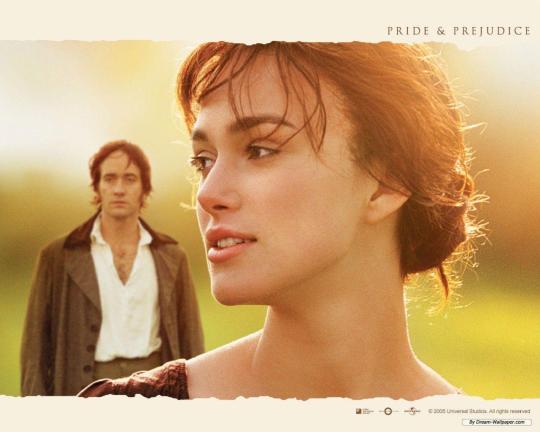
@colonelfitzwilliams @appleinducedsleep @obscurelittlebird @austengivesmeserotonin @princesssarisa @dahlia-coccinea @firawren @cobaltzosia
#book adaptation#pride and prejudice#pride and predjudice#p&p 1995#p&p 2005#keira knightley#mr darcy#lizzie x darcy#fitzwilliam darcy#charles bingley#jane x bingley#mr bingley#caroline bingley#jane austen#period film#period drama#movies#movie review#elizabeth bennet#long post
147 notes
·
View notes
Text
"Love, Life, and Your 20's" by Phil
Whether you're finishing up undergrad or preparing for a long stint in med school, your 20's define the rest of your life. Freedom, fresh knowledge, and ambition have recently fallen into your young hands. Now you just need a job and someone that you can stand for longer than three months. We know that your 20's can be perilous, but we think that we have a few tips to make sure that your 30's and 40's are enjoyable ones.
Time to Explore
All of your life, you have been told what to do, where to go, and how to do it. Now is the first time in your life when you are the official captain of the ship. Don't give up the captain's chair or set sail before you are ready to go. It's a big beautiful world out there, and just because others may have some experience in familiar waters doesn't mean that they can guide you to your personal destination. Unfortunately, now that you're out of college, your life is basically back a ground zero. No matter how many accolades you had, you aren't the big shot anymore, and there are now vast amounts of people smarter, stronger, and more experienced. You may be getting someone's coffee, you may be scraping every dime you have for your start-up business, but one thing is for sure. You're the new guy you're and a long way away from your partner. Additionally, you are in that weird phase of dating where you finally might have an idea of what you want, but now the girls around you always seem to be on the barely legal side or the cougar side (and it doesn't help that you're not used to either). These are all areas that may take some time to navigate, so our best advice is to pack a hefty lunch and start getting to know the place. Here's how.
Career
Suppose you didn't already know about 25% of recent grads are unemployed. In that case, 25% are underemployed, 80% of life's most defining moments take place by about age 35. If that wasn't enough, 2/3 of your lifetime's wage growth happens during your career first ten years. So what does that mean for you? Stop looking around at others and focus on your plan for success. You will drive yourself insane comparing your life to your engineer friend who's making 90k fresh out of college. It's cliche', but life's not a sprint, and for this marathon, you need stamina. This also means that the money will come, but you have to think long and hard about what you want to do before it does. Don't settle for a miserable job or major that you know it is going to be the scourge of your existence. So you wasted four years on a major you didn't like, so what. If you found out what you really wanted to do as a result of that, then it was worth every bit of it. Now, if you waste 20 additional years in a state of delusion, then that is the real tragedy. Make mistakes, bet the house, go all in, and have no regrets. You will be surprised by what you are capable of, and this is the one time of your life when this is totally acceptable. Actually, it's encouraged.
Love
With more than half of Americans are married or are dating or living with their future partner by age 30, this might be where the romantic crap hit's the fan. You may find yourself scrolling (stalking) Facebook just to see your high school sweetheart pregnant with her second child and long-time college fling getting engaged. You're desperately trying not to be that old guy still at all the college parties, but you do want some female company, and mom's ain't cutting it. Relax.
Before you have an emotional meltdown and a mid-midlife crisis, take a breather. We feel your pain, but this is, in reality, your perfect opportunity to mingle. You probably have more money, time, freedom, and dating experience under your belt than you have ever had before. Use it! Don't squander things and force unhealthy relationships; set yourself free and find your soul mate or a few drifters (whatever floats your boat). Sometimes it's a good thing that you don't have any personal ties holding back you from exploring any new face or regions of the world. With that being said, if you are in a healthy relationship, don't be an idiot and blow it. There is something to be said about puppy love, but relationships in your 20's are far more meaningful and lasting (for the most part). You are beginning to understand why Tom Hanks needed Wilson in Cast Away because companionship is something that all people desire at any level.
These are the glory years of dating where you (hopefully) learned from all your boneheaded mistakes in college and have started looking for girls who have a lot more staying power. Let's face it; the stakes are higher. No one should be forcing you down the aisle, but if you are with someone that you know for sure isn't the one. Do each other a favor and end it before pointless years go by and someone gets really hurt. Regardless of where you are at this time of your life, you should fully embrace it. Love is a beautiful thing, and you will certainly know it when it happens (so will your wallet). Just remember that you have a long life to live and that who you decide to be with is exactly that; who YOU decide to be with, whenever that may be.
Personal Development
This may be a shocker, but your personality can change more during your 20s than at any other decade in life. The brain caps off its last major growth spurt, and you are either refining good habits or re-enforcing bad ones. The good news is that this heightened self-awareness usually leads to a desire to improve one's self inside and out. Below are a few areas that need to be on the list if you aren't already looking to improve. We know you got everything under control, and we are going to let you finish, but these are kind of the essentials of your existence now. Pay attention.
Style
Okay, guys, it's time for you to lose those ridiculous tri-colored embroidered pants and get some real clothes that reflect your age. Yes, you will see terrible dressers at every age for the rest of your life, but now you no longer have a pass. It's no longer a phase; it's no longer a statement. It's childish, and we will laugh at you. Wearing sweats your college hoodie to the bar doesn't sound particularly bad (actually, it's pretty comfortable), but in reality, it's a sign of immaturity. As a man, your style should have evolved from frat house chic to young professional. Not having one good fitting suit and blazer is simply unacceptable at this age. It doesn't matter if your job calls for it or not, there are some places flip-flops just can't take you, and that's a good thing. If you can walk into an Urban Outfitters and fit in with every tinnie bopper, that doesn't mean you're a hipster. It means that you need to donate most of your clothes to Goodwill. Take it from us you don't want to be embarrassingly underdressed to work or dating functions. You might be able to skate by with a lackluster wardrobe, but is that really how you want to paint your 20's? Ditch the Nike's and grab a pair of desert boots; you will thank me later.
Gym & Diet
No, someone didn't pull a hilariously cruel joke on you and switch all your mirrors with the ones at the carnival. You're getting fat, and sadly your not getting any slimmer. Now that you can actually afford to eat whatever you want, your metabolism is throwing you a reality check, and you can bank on the fact that there will be plenty more deposits. If you don't want to lose that amazing physique that you have had all your life, you need to fight for it. Here is where gym memberships are at an all-time high and carbs at an all-time low. Now you don't have to go all vegan on us, but if you don't start investing in yourself now, there won't be much later for your twilight years (not a movie reference). Cutting down on the sweets and poor eating habits is just something that comes along with adulthood. The faster you realize this, the easier the transition will be. We all know the women will love your sculpted abs and the confidence they bring, but this is for your own self-preservation. But if you need some extra incentive, women will love your sculpted abs and the confidence they bring (just saying).
Personal Grooming
Alright, this last one isn't something that should have started in your 20's, but it is something that becomes blatantly obvious when not taken care of during them. Guys, it's time to start caring about your hair, your beard, and yes, your pores. What's the point of having a perfect body with an unsightly beard and body odor. This may be a shock, but 80-99% of people will not see your pecs during the course of the day, but they will see your filmy teeth and Eddie Monster widow's peak. Shaving, regular showers, and timely haircuts are beyond expected now. There was a time where you could get away with not being up on all three; that time is over, fellas. Good hygiene separates us from animals (that and iPhones), so don't feel feminine for wanting to make sure your skin isn't filled with toxins or that you smell pleasantly every time someone comes near you. One last thing, clip your nails. Just do it.
Now that you are in top shape, these are milestones that you need to go on. When you 21, 25, and 30 are causes for celebration and significant birthdays in your life. They each mean higher access in life and mark your growth as a man. Other important days to step out are on New Year's and reunions; they all trigger much-needed self-reflection and evaluation of life thus far. Don't focus on what you have done wrong, but more so on the experience, you have had and the people you shared them with. Grab a drink, get to work, and enjoy your roaring 20's.
1 note
·
View note
Text
Why You Shouldn't Let An English Teacher See Movies: a reaction post of IT:Chapter 2
Okay, so I finally saw IT Chapter 2, and I have some thoughts. Some of these thoughts might rub people the wrong way, which is okay, but be warned that I'm not going to hold back here.
As a whole, let me preface by saying that I loved this movie. I will go to see it 3 more times, and I will enjoy every moment. However, objectively… this is not a film that I can recommend to people as a “great film” artistically speaking. Is it fun and Good™? Yes. Did I enjoy it immensely? Yes. Were there some very odd and disruptive writing/direction choices? Yeah. This isn’t a masterpiece, as fantastic as I personally felt it was, and honestly I do not think it topped Chapter 1 in terms of flow, total presentation, or scriptwriting.
I’m going to break down my thoughts by category:
1. Story elements
2. Visuals & Horror
3. Tone
Starting with Story Elements:
I am incredibly torn on this. I LOVED aspects of this film, and was wildly confused by others. As a whole, I think the film began strong.
The re-introductions to the characters were fantastic, though taking the “historian” thing from Mike in Chapter 1 definitely made Chapter 2 weak in regards to his characterization. He’s a hard character to get right, but it honestly feels a little like they didn’t try, and just used him to progress the story. I could continue, but that is a whole separate Mike Essay. Bev, Ben, Richie, and Eddie were all fantastic. Eddie in particular was taken in a slightly more aggressive angle than traditional for his character, but it worked very well with the way he was established in Chapter 1, thanks to Jack’s interpretation. Bill was a little bit weaker in some ways, but still at his core Bill Denbrough. I unapologetically LOVE adult Stan, and only regret that due to the story, we don’t get to experience him as much as he deserves in the film.
The return to Derry was great, and I still think that the group dynamics are what make this story shine. 90% of what I loved so much in Chapter 1 was the group dynamics, and they are here in SPADES. The group makes sense together, and the cast did a great job, though Eddie’s constant repetition of the word “fuck” seemed a little unnecessary after the second time in the restaurant scene. However, one thing I think the miniseries did better is establish them as “the lucky seven” - they’re not just the Losers Club; they’re held together by fate, and there’s definitely some supernatural elements to that which are not present in the films, weakening their group connection. This is shown most strongly in their moments of conflict in Chapter 2, especially when they want to leave, because their draw to each other doesn’t seem to be present, at least not in the same capacity. It seems weird to feel let down by this considering my next point, but it is what it is.
Some may disagree here, but… I really dislike the decision to include the ritual of Chud in the movie. I disliked it in the book as well, as I think that it unnecessarily complicates things and turns this horror story into a surreal sci-fi story in a way that doesn’t always mesh well. King does both sci-fi and horror well, but I’ve always felt the crossover in IT was off somehow. Also, the lack of connection with this to the first film makes the ritual of Chud seem even weirder in Chapter 2. Mike’s characterization with this gets… odd… and its inclusion is very confusing. I actually said “what the hell are they doing” in theaters when Mike introduces this with Bill. That’s how weird it was for me. My biggest problem was that it makes Chapter 2 a sharp departure from Chapter 1, and failing to achieve the cohesion that the miniseries had is a huge downer for me, considering that the IT reboot is an improvement to the miniseries in so many other ways.
In comparison to the book and miniseries, I think that it was a bad choice to leave out Audra, as it was good closure for the Billverly plotline. Bill and Bev even kiss in Chapter 2 - and then it is promptly forgotten. I’m not necessarily looking for conflict, but Audra was a huge motivator for Bill, and it was much less significant to have his driving force be this random kid that reminds him of Georgie. I get it, but Audra helps show how Bill has grown more strongly and pushes him forward after the final battle. I also wanted a cinematic parallel between Audra and Bev in the sewers and was really disappointed that I didn't get it. I have similar feelings about Tom - yes, Bev obviously leaves him for Ben, but Tom had a huge impact on Bev and her growth. Leaving him out weakens her personal story.
I’m not going to say much about Henry, but the scene where he pops out of the sewers is FANTASTIC. I absolutely did not expect to get that scene (I figured we’d just pop in on him in the hospital), but was glad we did. However, this lost its impact the longer we went on; he was relevant for all of one (1) stabbing of one (1) Edward Kaspbrak, and then died without even putting Mike in the hospital like he was supposed to. A waste of his character.
There are other positives. The connection Adrian and Richie’s stories are great, and I think Richie’s moments of reveal are very well handled. I just wish the Adrian/Eddie parallels had been highlighted as well. Richie and Eddie are fantastic together, and Bev and Richie are also sweet as hell. Besties for the resties, man. In general, I think Richie’s relationship with the Losers is the strongest writing in terms of group dynamics. Putting aside his feelings for Eddie - which do a fantastic job of fleshing him out and showing how multifaceted his character is - he is the one Loser who has strong ties to every other character. Bev’s relationships with Mike and Eddie are weak, Ben’s most relevant relationship is to Beverly, Bill’s most relevant relationship is Mike - you see where I’m going with this. Only Richie’s writing showed the importance of all his group relationships, though some were stronger than others.
Almost every individual scene with the Losers and Pennywise are very enjoyable. The moments where their personal motivations and fears shine are truly the best in the film. While there were some design issues that disappointed me in terms of IT terrorizing them, their stories are great - the apartment scene with Beverly is still poignant, and Bill’s revelation about the day of Georgie’s death made me a little emotional. I’ve already mentioned this in general terms, but the arcade scene with Richie is fantastic.
As a whole, there is a lot of love here, and so much to enjoy. The script writers and the director worked hard on this film, and they tried to do a lot with it - just maybe too much, which caused problems with flow and tone as a whole.
Visuals & Horror
I love horror - I could go on all day about how it’s the best genre. As such, I have a lot of feelings about the horror elements in this film.
I already mentioned how the ritual of Chud/Sci-Fi elements weaken the horror - in truth, the horror elements were already weak. As a result, sci-fi elements distract from what already has flaws. There are two major categories for this discussion: subtlety and design.
In terms of subtlety, a majority of Chapter 2 was basically hitting you over the head with a Pennywise-shaped hammer. There were jumpscares everywhere, and they were rarely impactful ones. How many times did we get a “Pennywise chomps down on somebody” moment? I was totally engrossed in Adrian’s scene at the beginning, but when Pennywise just takes a bite out of him and it ends, I was honestly disappointed. I do realize this is book canon, but there is something about the presentation in the book - the precise moving of Adrian’s arm, the bite, the smile, the cracking of his ribs - that is dulled in the movie for a lack of a better term. There is just something about this death that fails to hit home. Maybe it’s because Pennywise is more or less out in the open, or maybe because in the book, the bullies see It, too, making it a surreal moment that no one believed except those who were there.
As a whole, the movie has plenty of gore but little suspense. I think I had more interest the less I knew about how exactly people died. Eventually you get sick of the chomping - the unknown is more frightening than a monster with a predictable attack pattern. The missing kids. Betty Ripsom’s shoe and lack of explanation. Patrick’s fade to black. These things made Chapter 1 unsettling, but scenes like Victoria’s death had no other elements other than being bitten to death by Penywise, and that was predictable.
For an example of what could have been in terms of subtlety, I can honestly say that I was more creeped out by “Mrs. Kersh” slinking around in the background of Beverly’s old apartment than I was by the old woman monster. For what it's worth, the way these monsters move is INCREDIBLE, especially so the more humanoid they are. I love the body language and movements. The earliest example is the headless boy in Chapter 1; the jerking limbs really emphasize their inhumanity, and it still works in this film (Mrs. Kersh at the end of the hall, Betty Ripsom’s legs, etc). This, with the use of humans and their subtle shift to the unnatural in the films, was much stronger than the larger monsters in Chapter 2.
Another strength is the background details that you might miss. The librarian staring at Ben as he reads about the Ironworks explosion in Chapter 1 is a great example of this, as is Mrs. Kersh peeking her head out of the kitchen in Chapter 2. I would have rather had more small scares like this, rather than the reliance on jumpscares. The pomeranian monster behind the “Not Scary At All” door is essentially just that, and I was WILDLY unimpressed by it.
Returning to the focus of the film, Pennywise the clown is a great villain, but a lot of Its appeal is that It shifts into whatever scares you most. In the first film, this is done well - the painting lady, the leper, the headless boy, and even the way it shifts in the battle at the end. The strength in these forms is that you never know what to expect - and neither do the Losers. Each new nightmare looks and behaves differently. The flute dropping from the painting lady’s hands to announce her presence, the dropped eggs in the library scene… everything about the leper. Even the miniseries did this variety well (the werewolf, the shower scene with Eddie, Mrs. Kersh, etc)
Yet, in part 2, we get… two extra monsters. Which is fair - we already have plenty of material - but they both have the same style of warped features and aesthetic. I think creepy naked old Mrs. Kersh would have been a more disturbing visual than old lady monster turned out to be. Sometimes less is more. Clowns are creepy because they have almost-not-quite-human features… the same can be said of effective monsters (look at the leper, for example, or the painting lady).
Pennywise in general and Its overreliance on Its clown persona weakens the effect. Eventually, Its presence becomes “oh, there’s the clown again,” especially considering that Its attack pattern has become so predictable. Is It going to drag me into the darkness? Is It going to manipulate me into hurting my friends? Is It going to do some other scary thing to me? No, he’s going to take a bite out of me. Not awesome, but certainly not the Pennywise of the novel or even of the miniseries, whose horror came from the fact that no one knew what happened when you disappeared - or when parts of you reappeared.
There were too many instances where the horror was all about jumpscares and theatrics. Pennywise is all about theatrics, I know, but It went from eldritch horror to dramatic murder clown in this film. In the book, Pennywise is extra as hell, so I wouldn’t be angry if that was the angle taken for the films - however, that is not what was established in Chapter 1, and isn’t actually what is achieved in Chapter 2. If we are going for a more serious, darker tone for Pennywise, I would prefer the eldritch horror we saw more strongly in Chapter 1.
Tone
This is the hardest category to explain well, because a lot of this is my personal impression of the film, but I’ll do my best. As a whole, the movie does not flow well, especially connected to Chapter 1, and this is largely because of tone. Some scenes shift too abruptly or push too hard, and I feel as though the writers were trying to capture the same charm and attitude that Chapter 1 achieved with the kids, but struggled because they aren’t kids anymore. The balance between gritty horror and charm is harder with adults, but this is something the miniseries excelled at compared to Chapter 2. In the miniseries, you never feel like you’re watching a new film when it switches to the present day with the adults. In IT Chapter 2, though the movie and story are meant to be a continuation, it feels more distant, like a sequel that doesn’t quite achieve the same mood.
I’ve said that the group dynamics of the Losers really shines in these films - however, it’s also a major problem in Chapter 2, because there are several times where the writers sacrificed the integrity and tone of a scene to fit in some banter. I love the banter, okay. I’m all about it. The banter in the IT movies is my favorite banter that I’ve seen in a fictional friend group, and yes, I’m including Stranger Things and classics like The Breakfast Club or the Goonies. However, when it’s ruining an otherwise impactful scene, it feels wasteful and disruptive.
A good example is the scene with Richie and Eddie at the doors in the caves. This scene is fantastic - it’s funny without being a gag, and it showcases the brilliance of RichieandEddie. However - and this is a big however - every other Loser’s individual scene is dramatic and dark - tonally appropriate. Richie and Eddie, however, have their moment melding humor with some jumpscares, and though the scene is great on paper, it makes no damn sense compared to the tone of the rest of the damn sequence. There is no logical room for comedic relief here, and it was jarring, no matter how much I enjoyed the scene itself. Tonally, Richie’s one-liners in Chapter 1 made more sense, and the script of Chapter 1 did a much better job ensuring that those tiny breaks in tension do not disrupt the scene or atmosphere. I cannot say that about certain elements in Chapter 2.
The Losers work very well together, but they also have a tendency to get chaotic enough to break the atmosphere. In the book, there is a lot of quiet horror amongst the Losers Club that is disrupted in Chapter 2 by the multiple scenes where they just scream over each other during crucial moments (such as the scene in Jade of the Orient). The quiet fear and understanding amongst the Lucky Seven that made them such a dynamic group of protagonists just doesn't exist here. Every quiet moment is a moment for arguing or freaking out here, and it got tiring, especially when we went right back to individual reflection and exploration after. I use the term “quiet” here quite a bit, but I’m not sure how else to express the atmosphere I’m talking about. Hopefully the point gets across.
This may just be personal preference - I really enjoy subtle horror, as I’ve said. The moments where the Losers watch and take in the terror as it unfolds are important moments and are lacking in Chapter 2. I can’t empathize with the screaming and freaking out, but the dawning horror and realization of what’s happening puts me right in their shoes. Beverly’s slow realization when she’s staring at the picture of “Mrs. Kersh” and her “father” is a moment like this, to put it in context.
Even more so than the Losers’ attitudes is the lack of the “dawning horror” vibe in the film at large. It is not meant to be an action film, and yet Chapter 2 is constantly go-going. The action is in places more akin to a slasher than the slower supernatural horror this story is meant to be. Chapter 1, with its slow reveals and strengthening group dynamics, hit the intended mood better, and seems further separated from Chapter 2 as a result.
Chapter 1 did a great job with balance - it knew when it was appropriate for the funnies, and how to shift that into the horror elements seamlessly. It also did a great job throwing in Richie’s one liners without ruining the balance of the scene, but Chapter 2 had several instances where it took those quick Richie moments and turns the focus entirely on him, breaking up scenes in a jarring way. An even more disruptive example is the “Richie said it best last time” bit before they entered Neibolt. The entire scene shut down for Richie’s moment, and it ruined the suspense of what could have been a really nice parallel to Chapter 1. We didn’t need the tension broken in many of these instances, and it was difficult to go back and forth. The focus on Richie is because of the positive fan response to his character, which is well deserved in my opinion. However, this could have been done better.
Tonally, Pennywise’s script also came on too strong. The Pennywise we know and love is a lurker, manipulating humans and taking other forms rather than doing all the dirty work directly. Chapter 2 has moments of this, but more often has Pennywise as an aggressively taunting antagonist. It becomes loud and exaggerated. Part of this can be attributed to rising tension as the Losers return to finish It off, but Its dialogue is hammier than I expected. It’s become almost petty - and not to needle at the Losers, but more because It’s bitter and childish. I don’t know if it’s too much to use the term “eldritch horror” again, but I don’t know how else to describe what we were set up for with Chapter 1 and let down on in Chapter 2.
As a whole, I felt like the film was stitched together in places. After Chapter 1, I felt that I had just had an experience, but after Chapter 2, I actually looked at my best friend and said “I liked it, but I’m not sure what just happened.”
Let it be clear that I love Chapter 2, and will happily rewatch it many times in the future, but I do think that compared to Chapter 1, it is a far weaker film overall. You can watch them together for a similar experience to the miniseries, but it will be less cohesive and will feel like it fell apart a bit the longer it went on. I don’t fault the writers for this entirely, as the second half of this story is a daunting undertaking, but I think removing the sci-fi elements with the ritual of Chud and tightening down the horror aspects/tone would have made this a stronger continuation of Chapter 1.
10 notes
·
View notes
Note
So! Been seeing you post a lot, so I figured I'd offer a lengthy neutral take (I don't ship, as a rule). From my perspective, the core problem with Tom and Star’s relationship is that, to put it extremely bluntly, Star likes Marco more. That's not to say she doesn't like, or even love, Tom! But it means that so long as they’re together, there will be a part of her that’s unhappy things worked out this way. (1/6)
As to why Star prefers Marco to Tom, I think it’s pretty straightforward: Tom is one of many, MANY people who put pressure on her, and Marco is one of the very, very few that doesn’t. I think the most recent episodes demonstrate this pretty well—Take Tom’s plan for a trip. (2/6)
It was well meaning! It was sweet! But for Star, whose life has been an increasingly stressful and dramatic trainwreck ever since Ludo stole the spellbook, it’s another lump of pressure that Tom has inadvertently dumped on her—especially since he leaves the planning to her (Another well-meaning gesture), at a time when she’s incredibly burned out from making decisions and plans for everyone else (Up to and including a royal coronation with thousands of guests). (3/6)
Contrast this to Marco—the second Star arrives at the door, she’s welcomed with open arms, and is allowed to spend the entire next episode as a limp lump of flesh. And that’s really how Star and Marco have functioned throughout most of the series—On Mewni, Star is beset by responsibilities and expectations from her parents, Eclipsa, the people, the monsters, the Magical High Commission, etc. (And as well-meaning as Tom is, he’s a part of that largely due to his own insecurities). (4/6)
But with Marco, Star has someone who doesn’t judge her, doesn’t ask anything of her, and will always have her back in a fight, without exception (And the one time he is a burden, by returning unannounced in Lint Catcher, he recognizes what he’s done, apologizes, and offers to go back to Earth before Star decides to make him her squire). He’s a rock in the storm, as opposed to Tom who occasionally is the storm. And for someone in Star’s position, it’s easy to see why that’s so desirable. (5/6)
I genuinely like Tom, and I think he’s made an incredible number of strides since his first appearance. And I think that no matter how the series ends up, he and Star will remain friends. But there’s a reason why their relationship is troubled, and it’s not all on Star. But, that’s just my take. (6/6)
Well, i have to disagree with about everything you said i’m afraid.
Tom putting pressure on her is the complete OPPOSITE of who his character has become as of recently, because putting pressure on her, and making her do things was something he abandoned all the way back in s2.
That was what Mr Candle Cares was about, Tom respecting Star’s choices and for him to stop trying to make them for her.
Marco had this conversation with him directly, to let Star make her own choices, and he needs to consider what SHE wants, and from that point on tom ends up always letting star make her choices.
In Club Snubbed, he literally outright is not trying to pressure her at all, his intent was to never come off as though he was coming onto star, and he wanted her to make all approaches towards him.
Tom even mentions in THIS episode, he does not want to ever pressure star into doing anything she doesn’t want to do.
Something people seem to completely forget about their dynamic is tom lets star do what she wants, at the end of the day, star is the character who ends up winning their side of the argument.
Whether it’s Monster Bash, Is Another Mystery, even technically Blood Moon Ball counts. Because Tom’s efforts for that ball were all to please Star and do what would make Star happy.
While in those situations Tom was being selfish to a degree, at the end of the day, Star ended not being pressured into anything, she got her way and Tom usually had to apologize for it.
Tom never really gets to do things, he wants to do, because Star and her stuff always ends up coming first for him, whether he wants it to or not.
Like, is tom letting star pick what she wants out of a fun trip something really to shun him for? Tom didn’t sit there and force star to pick anything, he gave her a book and suggested she find some places she wanted to go because she wanted to go on the trip with him.
That’s not pressuring her, pressuring her would well...be him almost demanding her to do so, but he doesn’t. He’s upset she didn’t choose anything but he doesn’t make her do it, he suggest to help her out and be supportive since she said she was having a hard time.
Like, why is tom now a bad boyfriend, for letting star have a say in a trip they agreed to go on together?
Tom’s not really doing anything wrong here, the entire conflict is due to star’s own internal issues and an identity crisis. Not to Tom wanting her to help plan their trip.
Star doesn’t pick anything because she doesn’t know what to do with her life and she doesn’t even know what to do now that she’s free. Something she mentioned herself.
I mean, this is the only example you give me of tom pressuring her, and it’s just him letting her pick places for them to go? That’s....not a problem, Tom’s doing what he tends to do, let Star have a say in everything.
And blaming Tom for being part of a society that’s not his own fault? Tom was born into royalty, you shouldn’t say Tom’s now suddenly a really bad boyfriend, because of something that can’t be helped about his character.
Heck, marco is a PRINCESS, and you left that out of this conversation, marco has his own ties to mewni and ignoring those as being issues because the person associated with them isn't tom isn't cool. Marco is also a part of that, and that can’t be ignored.
Tom and Star have their own chill moments, they were friends before they even dated, you’ll find them hanging out in star’s room, playing board games with tom’s family, surfing, ect.
Tom admires Star, he wishes he could be, someone like Star. Star is the person who inspired him to be a better person, to care about conflicts he was never involved in, to grow and change and become a better boyfriend to her then the first time around. And when duty calls, he’s here to help her out with whatever she needs of him, no questions asked. When Star went to face meteora alone, Tom went after her, because he wanted to help, because he has her back and won’t let her go through this all alone.
When Tom screws up, he apologies, he doesn’t fight it, he accepts when he messed up and he doesn’t try and worm his way out of it. Tom matches Star’s chaos half the time, them both being wild ones, but tom also manages to be more mature then Star.
They both can be reckless, but Tom helps give her hope when she thinks she’s lost it all, he is always there to be supportive, and when she screws up he doesn’t flip out on her, he acts reasonably.
Tom didn’t need a blood moon in the sky to repair his relationship with Star, he worked his but off and earned her trust and friendship again, and Star returned his feelings.
Tom puts so much effort into his relationships, Marco is terrible at romantic relationships, time and time again he is shown he just can’t handle them the same way he handles his friendships.While Tom works to do better, Marco just...doesn’t try, he seems more comfortable without dating the person because he seems to have a serious issue with commitment.
While Marco and Star have remained the same these days, Tom and Star boost each other up to do better, even when things are rough they grow and they learn to do better together.
Marco and Star stay where they’ve always been, but tom and star always keep growing and so does their characters because of their relationship specifically.
Tom is not lesser, and it is not ok nor fair to treat him as a lesser being then Marco in star’s life.
Marco is her best friend.
But that makes Tom no less important to her growth and who she is.
You can say Star is somehow unhappy to be with Tom, but if that was the case she would’ve left him long ago.
Even under blood moon influence, she and tom still stuck together, a magical moon curse couldn’t even break them apart.
That should mean something.
Saying Tom is lesser to Star makes Star seem cruel and it overlooks the entirety of their set up relationship.
36 notes
·
View notes
Note
When you write your fanfics, do you plan ahead or write what comes to your mind?? What aspects must a fanfic have to be good quality in your eyes?? BTW big fan of yours;P
It’s a bit of both to be completely honest, darling. Most stories I have the general outline already planned out before I start writing. I knew pretty much the entire plot of Consuming Shadows before I started writing (and that was 3-4 years ago). Same with you belong to me and Gold Dust and yesterday i died, tomorrow’s bleeding. I know the overarching plot like the back of my hand, all the major moments and points of character development. There are no big surprises for me when I’m writing, and very rarely will a scene that has serious ramifications on the overall story/characters come to me. I actually have a rather rigid focus when it comes to that.
That being said, a lot of the details of the scenes seem to almost write themselves. I know the basic gist of what I want to happen in the scene, but the dialogue and the individual actions tend to just come to me on the fly as I go. Take the kiss scene in CS Chp. 38. I knew I wanted the kiss to happen in that chapter. I knew I wanted Hadrian to threaten Riddle with the knife. I knew I wanted Hadrian to be marked. But I had no concrete plan of getting from one moment to the next. That just comes to me randomly as I go.
If that makes sense??
As for what makes a good fanfiction? This is purely my personal preference, and I don’t mean to say that stories that don’t have any of the elements I like can’t be good. This got a bit long so there’s more under.
PLOT
I just find it extremely hard to get into multi-chapter stories that have a weak or uninteresting plot. I need stimulation. I need mystery. I need intrigue. The more compelling a plot, the more likely I’ll get drawn in. Plot is just such a core part of long stories, that it has to be strong enough to weather itself. A plot can’t burn out. It can’t lose too much traction. Of course there can be moments of respite or calm, but the longer the story, the bigger the tension needs to be to keep interesting. It’s a really thin line to walk, since you don’t want your story to be so high-strung it turns people off and they never get a breather, but at the same time you don’t want long gaps of inactivity. CS is where I’ve been trying to learn this balance of action vs. inaction, and I still feel like I’m failing in most instances.
But yeah, I typically know within the first chapter if I’ll like something enough to keep with it, and I know that’s kind of rough, since like CS, most stories take a couple of chapters to really do anything, but that’s always been me.
CHARACTER
My second biggest thing is character. I can’t stress how much I need to click with a character, on some level. There needs to be something about them that I can look at and be like I get that. I think the more emotionally/mentally damaged the character, the more intriguing they are. That’s basic human nature in a lot of ways. We’re drawn to the broken ones.
More often then not, my favourite characters are the ones with issues. Tony Stark. Wally West. Harry Potter. Tom Riddle. Naruto Uzumaki. Keith Kogane. Izuku Midoriya. Bruce Wayne. Stiles Stilinski. Edmund Pevensie. I am drawn to every single one of these characters because they are, in some fundamental way, fragile. (And yes, I know that all of them are male, don’t think I’m hating on damaged female characters, there’s plenty to pick from, these are just my personal favourites). The more compromised a character is, the better.
No one likes a Mary Sue (though they certainly have their place, too). For me though, characters need to be flawed in some way. Whether through some form of trauma, through their own reckless sense of morality, or simply from something as simple as a personality trait. It’s important that characters reflect some version of reality. No one’s perfect. Everyone’s got something that’s a mark against them. Once you find that for a character, it instantly makes them more interesting - note, interesting, not likeable, there’s a strong difference between a likeable character, and an interesting one.
TENSION
This is a lesser thing, but still remarkably vital in my eyes. There needs to be some form of tension or conflict (of course, this isn’t always the case, I just tend to drift to the angsty stories because I’m a glutton for that sweet, sweet pain). Tension is key because it instantly gives us things like stakes, and obstacles, and, perhaps most importantly, growth. A character or story with tension/conflict is immediately presented with an opportunity to grow. The higher the tension/the more painful the conflict, the more room you have to play with. Tension let’s writers experiment with their characters.
Tension let’s certain things be revealed - the type of person your character is, their desires, their motivations, etc. This kind of ties back into the plot in a lot of ways as well. Stories need a good balance of tension and resolution. Each problem in your story should have a solution - whether the character actually solves it is just another point of tension. Or perhaps it’s something they could easily do, but something holds them back? (Sorry to keep bringing my own work into this, but take Hadrian and Riddle’s interaction with the kiss/mark. Hadrian could have easily avoided that whole mess if he just sat down and spoke with his mother, but because he didn’t, it became a much bigger problem than it should have been. And that snowballs from there. Tension.)
DIALOGUE
Last point, I swear. Dialogue is also a thing for me. Stories with good dialogue are excellent. I think a lot of stories/author don’t understand what an effective tool dialogue can be when used properly. You can reveal so much about a character with just one single line of dialogue. You can solve a million issues with a simple sentence, or, alternatively, you can cause a whole storm of problems with one slip of the tongue. Dialogue is dangerous because it serves so many purposes. You can have conversations between Character - Character, or Author - Character - Reader, depending on your wording. It’s a beautiful, multi-layered thing that doesn’t always get the credit it deserves. Dialogue is one of the most fascinating things at your disposal when writing, and you can always tell a good story from a great one based on the dialogue (not all stories have dialogue in them, of course).
Speech patterns, vocabulary, all of it. Dialogue can breathe life into characters. It should never be underestimated.
I’m so sorry! This turned into a bloody essay. Omg. I don’t normally rant this much, but your ask come when I was doing my Creative Writing assignment on the techniques used in a book I’m reviewing so I was in the analytical mindset. I hope this helped though? Please note that I’m not saying these are the ‘be-all and end-all’ of good story elements. There’s plenty of stories out there that are fantastic without some of the aforementioned things. Again, personal preferences! Thank you though, Anon! I’m glad you like my stuff
25 notes
·
View notes
Note
What are you top 10 favorite episodes and top 10 least favorite episodes from S1-3? Maybe leave a tiny summary as to why like/dislike an episode.
In episode order and not ranking order, also a very incomplete list:
FAVORITE EPISODES
Blood Moon Ball - for the dance and the Starco undertones, sure, but mostly for the talk on the balcony. I still have to see another scene showing such a level of emotional understanding between two characters, ready to swallow their pride and realize their mistakes for the sake of friendship.
Storm the Castle - still one of the episodes with the biggest emotional impact to date, and with one of the most meaningful hugs. Obviously since then we got several episodes with higher stakes and more dangerous situation, but this season finale was a first, and a sharp contrast with the rest of the series so far & with Star’s usual personality.
Ludo in the Wild - one of those episodes you can do only once per season, or even more once per series, and they nailed it. Became even better retroactively since Ludo is one of the most psychologically complex characters in the show.
Sleepover - the Mind vs Heart themes was beautifully introduced by this episode, and it’s something that has affected the whole shipping in the show all this time. Also a fun episode by itself with an excellent usage of lights during the climax.
Into the Wand - first episode that pushed the pedal on lore. And sure, maybe some things were mood more than foreshadowing and the final payoff to Toffee’s story might have been a bit anticlimactic, but this episode on its own was excellent at setting the mood
Bonbon The Birthday Clown - pacing wise the best episode in the series to date in my opinion. It handled two different stories extremely well, and tied them together in a way that was both emotional, fundamental for Star’s growth, and important for the plot.
Toffee - as I said Toffee’s story/role in the show on its own could have been handled better in its climax, but it’s otherwise an extremely strong episode. The whole scene from Star’s death to her return is the single part in the show to date in my opinion, and it was extremely satisfying to see Star capitalizing on all the growth from S2 to save the day.
Deep Dive - what makes Star and Marco’s relationship special, the episode. Also, mysterious magic plot. Also, Janna.
Booth Buddies - I would lie if I said I enjoyed watching most of S3, given all the tensions between Star and Marco and the changes in dynamics, but at the same time I feel like this episodes made everything worth it. Minutes and minutes of Star and Marco being emotionally close and baring their hearts, even if just for a moment, after a season of pain. Clearly it didn’t solve everything, as we are still currently experiencing, but it was still an important and deeply emotional episode. A worthy successor to the balcony talk in Blood Moon Ball.
Divide / Conquer - again, a bit of a letdown when it comes to Meteora’s climax in the story, but all the Star - Marco - Tom moments were the very top of what their characters can deliver, and the final scenes with Eclipsa and Meteora were once again top notch (the show gives its best when a mom sees her daughter die, yay...).
LEAST FAVORITE EPISODES
You know, I’m sorry but I’m going to skip this. I’d rather keep things as positive as possible the day before Curse, before potentially growing to hate everything the show stands for :)
33 notes
·
View notes
Text
Earning the Happily Ever After: Star’s Season 4 Arc Prediction (with a primer analysis for Seasons 1-3)
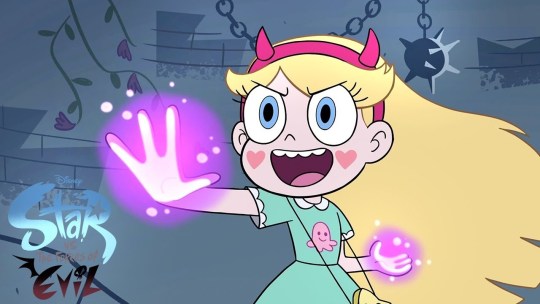
Time to break in my blog with my very own speculation post. This is going to be a very general but also very far-reaching take on the final arc of the show for Star, based on what I know about the show thus far and the tiny bit of detail we got at SDCC. I’ll be doing overviews on Star’s arcs and how the show always ties in the personal growth she’s undergoing to her relationship with the kingdom and her relationship with Marco. Finally I’ll try to piece together how things, on a broader level, might go down for our rebel princess and karate boy in what is almost certainly the last 21 episodes of the show.
The bulk of this post breaks down the past 3 seasons. There will almost certainly be redundancy with other posts people have written for Tumblr or elsewhere, and I don’t claim any of it is brand new information. I still do hope you give it a chance as it ties everything together in a way geared towards providing context for my Season 4 assertions, but if you are so inclined to skip ahead, simply search for “Season 4” and jump to the next instance after this paragraph (or even “TL;DR” for the fully abbreviated experience). There will be a recap of the critical context included.
Long post after the break!
So let’s begin breaking down Star’s primary arc season by season. Obviously character growth is fluid and you can’t pin down individual moments as the moment a character flaw was “fixed,” but there’s still some discernible changes to extract here. Each season’s title is her major obstacle during the season and the aspect of maturity she gains as a result of her growth.
Season 1 – Innocence/Awareness
Star’s defining trait of season 1 was being carefree to a fault. She uses her magic for whimsy and doesn’t really heed the consequences. It was the reason she was sent to Earth, after all!
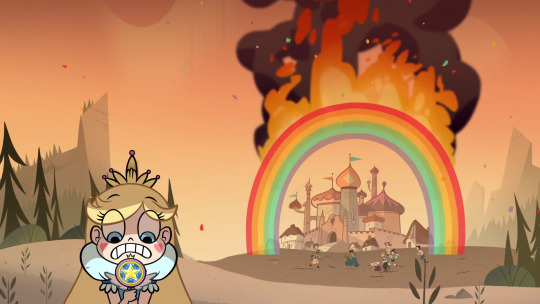
Similarly, her initial crush on Earth is based entirely on literal flights of fancy.
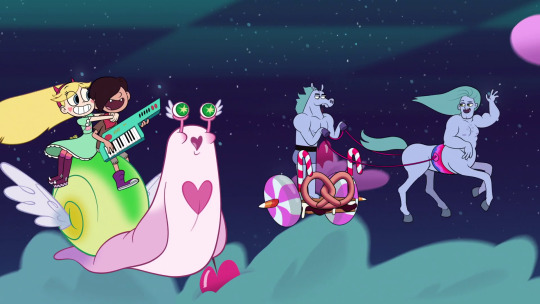
As the season goes on, Star gets her first tastes of the seriousness of the real world and culminates in her first major confrontation with it. It’s almost poetic that Blood Moon Ball, where Star and Marco’s relationship gets the first real hit of emotional depth, is paired with the segment which introduces us to the first serious threat in Star’s life.
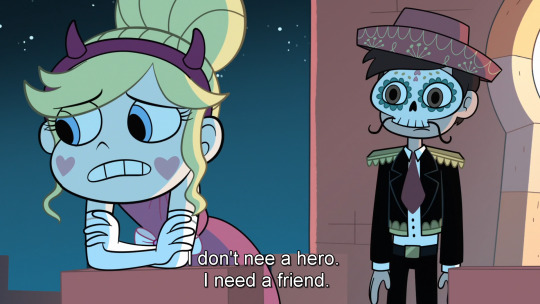
(see this is why I need new copies of the episodes smh goshdang subtitle typos)
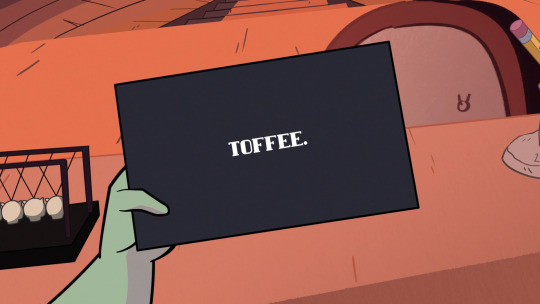
She’s still not the most mature about it and is still scared to death or outright ignorant of the complexities in the world for a while,
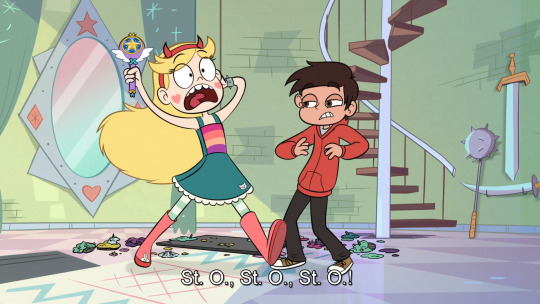
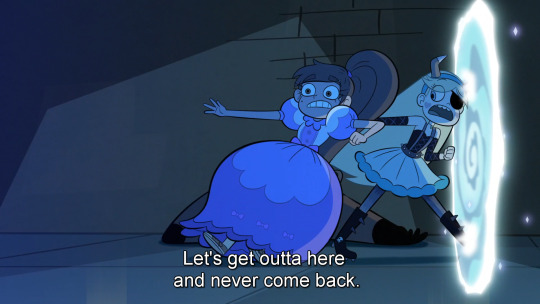
but still makes some initial steps forward in her character.
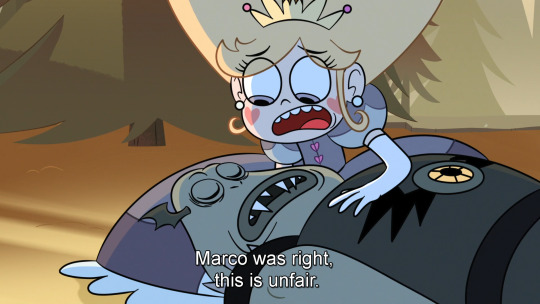
The season concludes with Storm the Castle, a turning point where she has to tackle a major decision with serious consequences head-on. Is it any surprise that this involves both her relationship to the kingdom and Marco? By this point I should hope it isn’t.
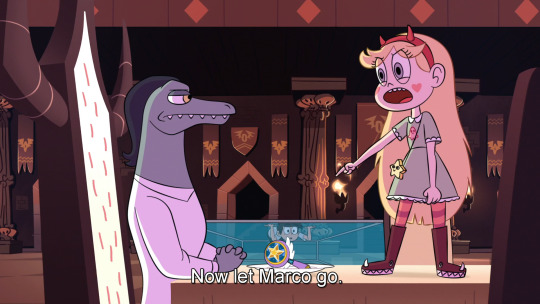
Season 2 – Avoidance/Determination
So after Storm the Castle, Star had passed a point of no return. She was officially aware that the world is a complex place, that it’s not always going to be fun and games and rainbows and unicorns. Most of this season is about Star realizing that she can’t just sweep them under the rug and hope everything gets better on its own.
The season opens with both the results of plot seriousness and relationship seriousness affecting Star’s life, because of course it does.
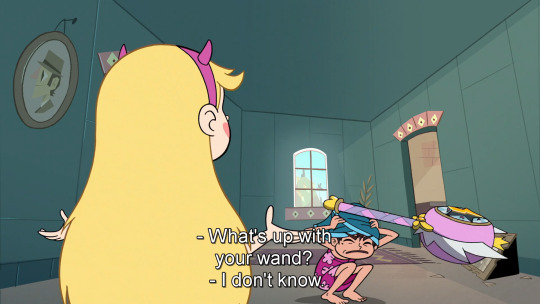
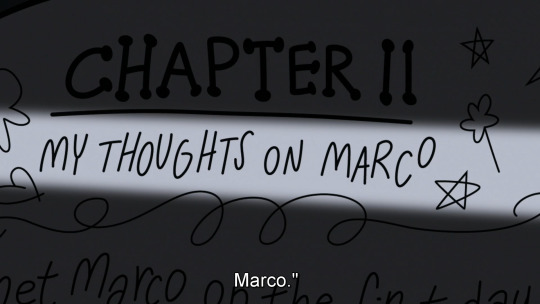
Fetch, an episode most notable for appearing in lists of reasons why people don’t like season 2A, actually delivers one of the most direct character arc expositions in the show.
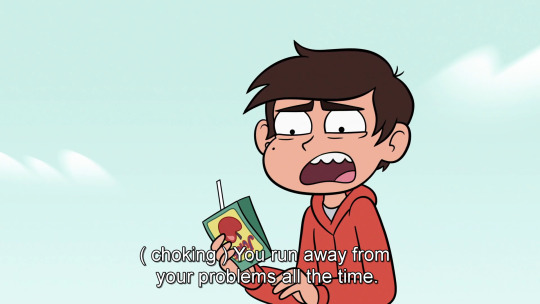
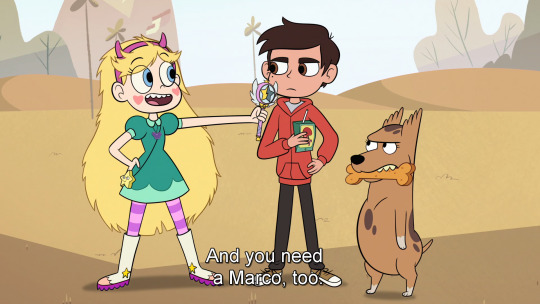
Let’s throw in By the Book, a segment entirely focused on her desire to just brush off magic training, just for fun.
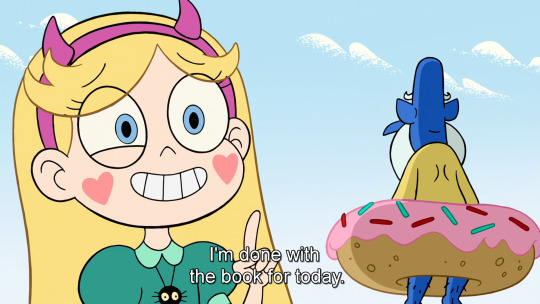
And Sleepover is where it first becomes painfully obvious that she has romantic feelings for Marco,
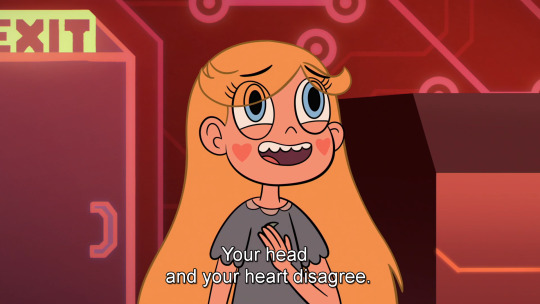
but it’s clear from her diary in My New Wand (and especially now that the SDCC panel blessed us with the full “My Thoughts on Marco” chapter) that she’s been lingering on them and trying to avoid them since the beginning of the season, just like her other problems.
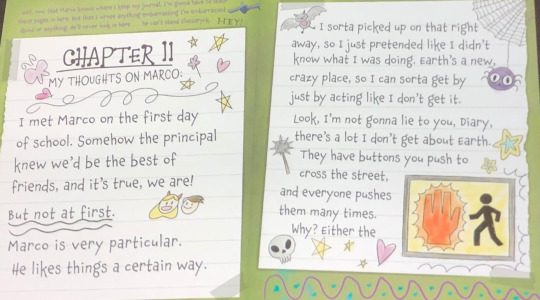
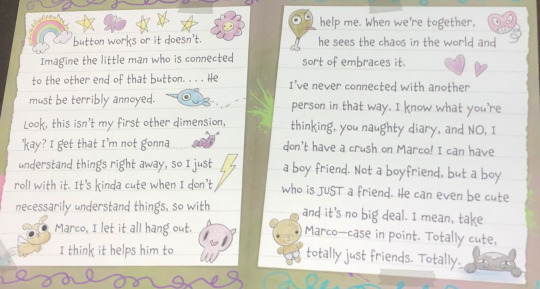
Star’s denial ran deeper than the actual Nile. Moving on.
Then we have Bonbon. Hey, what do you know? A pivotal episode in Star’s character growth which includes and connects both her relationship to plot and her relationship with Marco!
“I lost everything.” …mere minutes after feeling like she was losing Marco. Hell, even seconds if you count the moment he and Jackie had right after the green vortex closed. Clearly the line is consciously about her book and mentor, which are very important to her, but obvious subtext is obvious.
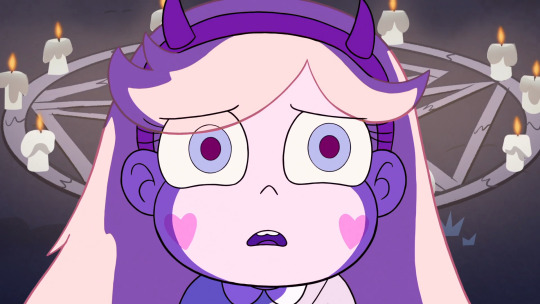
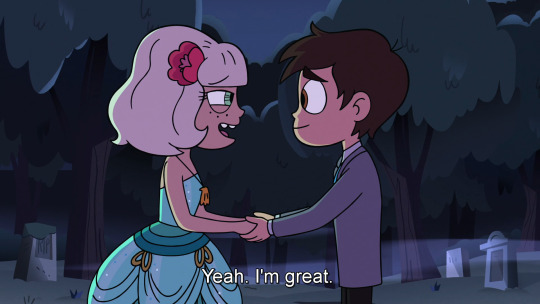
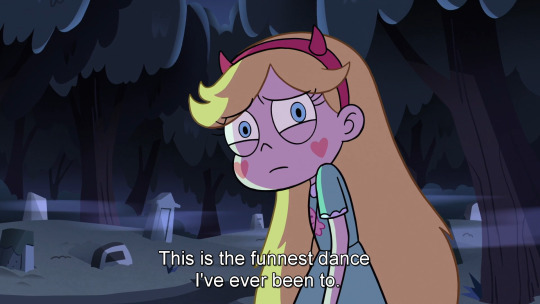
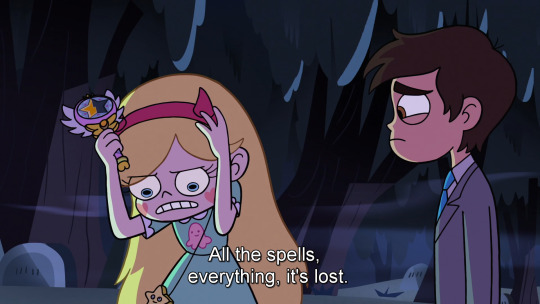
There aren’t really any major turning points during season 2B until the finale. In Face the Music, Star uses Song Day to open up to the world because she knows hiding things for too long isn’t right, which (with a bit of “help” from Fallout Boy) spurs her to apply that to her love life in Starcrushed. Star exposing her bottled-up princess secrets to the world and her bottled-up feelings to Marco both happening in a finale? Egad, I dare say this seems to be a pattern! Let’s pretend like this is surprising.
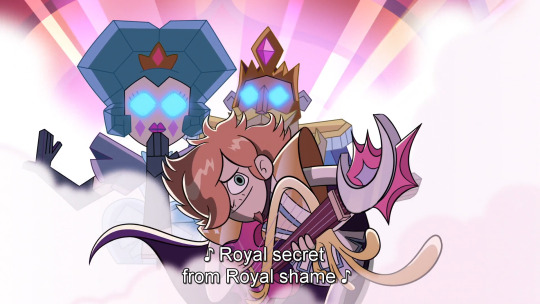
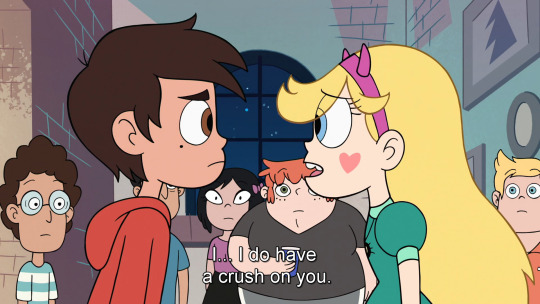
Battle for Mewni is a bit of an edge case, as it is sort of separate from the Season 2 arcs while also being the resolution to them. Suffice to say that while the “official” character arc in Season 2 of hiding or running from her problems was “solved” within the official boundaries of Season 2, it took BFM to have her actually tackle the immediate danger posed by it.
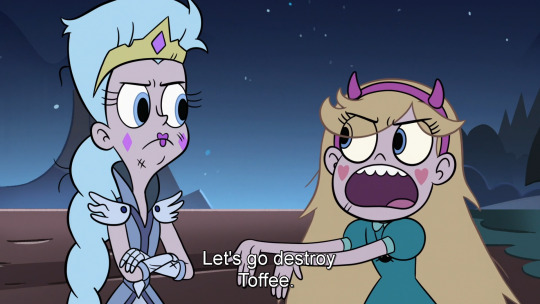
And she’s fully owning up to her feelings for Marco to boot.
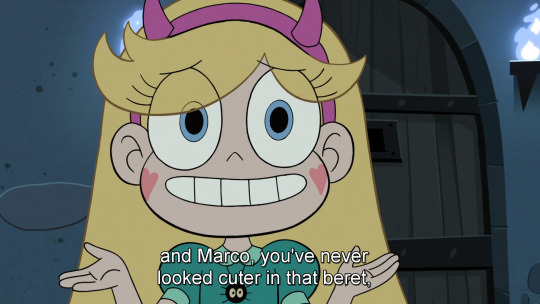
Season 3 – Idealistic Hastiness/Wisdom
I struggled more coming up with a single term to best address my take on this season’s arc, especially because it seems (to me, at least) that Star’s plot arc this season is split a bit more heavily by midseason than in Season 2. To elaborate on my choice of “Idealistic Hastiness”, I’m referring to her finding problems that she needs to solve and taking what seems like an easy solution – unlike in Season 2, when she may have tried to apply bandaids to cover up the problems, in Season 3 she is genuinely interested in solving them but jumps the gun and struggles with what seems like the “easy/obvious/right thing to do” not actually working.
I may abbreviate some details here, since I already helped Seddm construct the post to end all posts about this particular season, so please consult that for any further examples and supporting evidence about the meanings of Star’s words and actions especially in the relationship arc.
(It seems my subtitles are broken for most of Season 3 so I’m adding manual captions sorry if they look different or bad)
As the main part of Season 3 opens, we have Star identifying problems in her life and wanting solutions to them. In the case of Marco, it’s her unrequited feelings driving her insane.
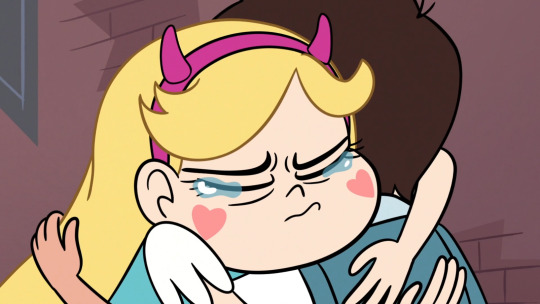
In the case of the plot, it’s initially a vague desire to “be a better princess” which later takes a few coherent forms.
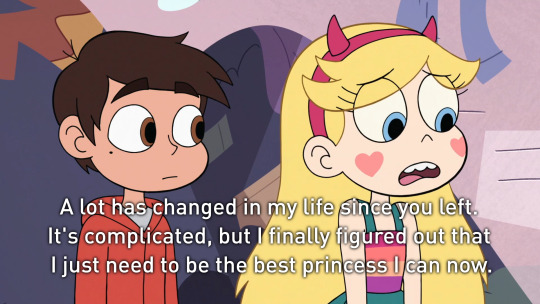
And Star isn’t totally clueless about her relationships, she knows she needs support and that her life is too chaotic to throw herself into a committed romance.
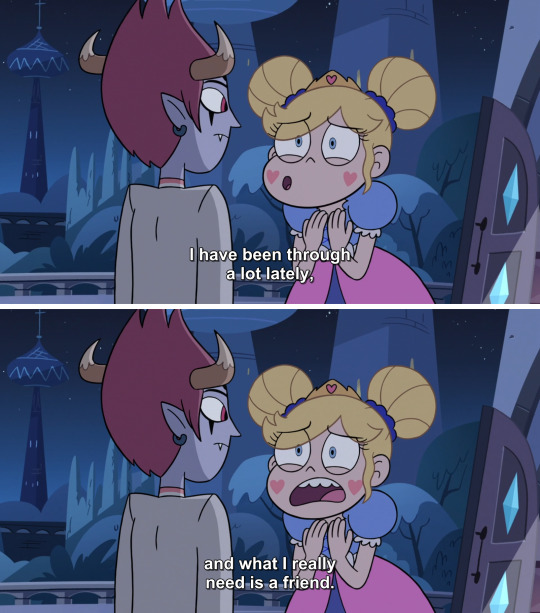
But the heart is a tricky thing, and a genuine emotional connection with someone she has some attraction to (plus a lingering heartache from Marco) leads to a romantic relationship with Tom. Suffice to say, that turns out to have the exact problem Star herself prophesied! She largely ignores Tom and isn’t willing to commit to their relationship (for a host of reasons, most of which involve Marco). And Tom isn’t a stellar supportive boyfriend either, but this post isn’t about that. Simply put, the emotional connection between them over their mutual struggles to improve is real, but it’s gone about in a very suboptimal way that they think is the correct one – Idealistic Hastiness at work.
For Marco, a similar dissonance between what she says and what happens are two different things. Lint Catcher has the wedding squire vows, in which Star basically outlines the importance Marco has in her life in a flashy ceremonial manner
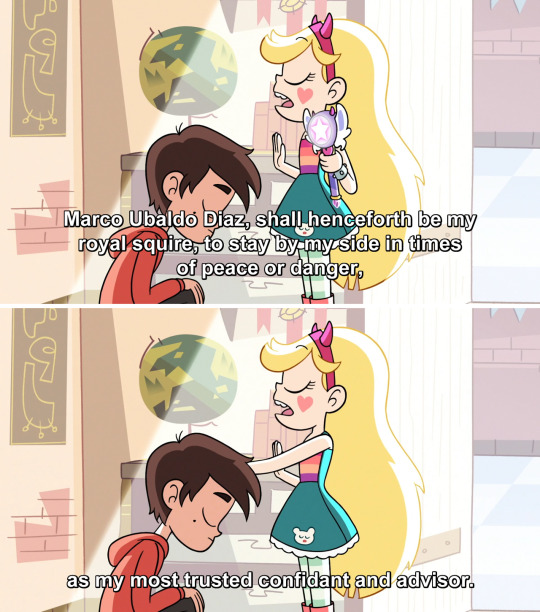
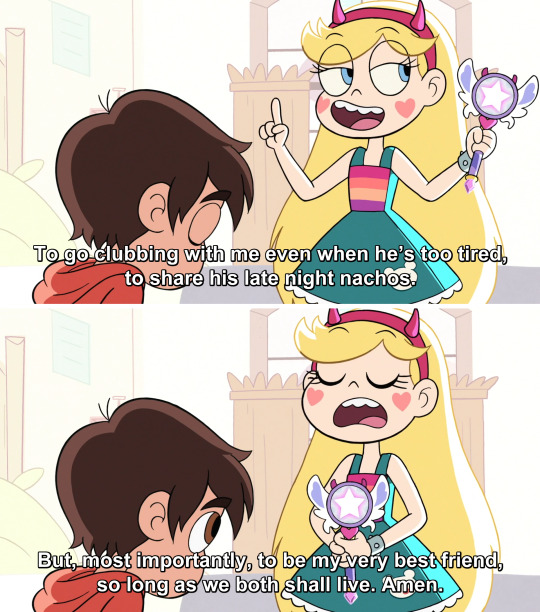
followed by a nearly immediate 180 in Trial by Squire.
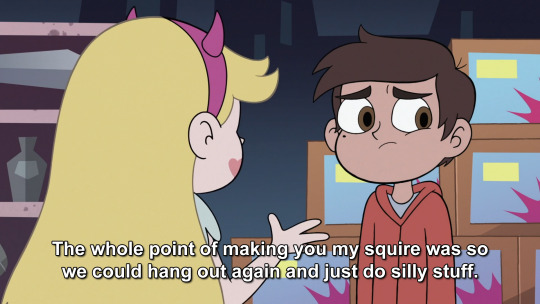
She did, to some degree, believe that the current situation was ideal, with Tom as her boyfriend going through a similar phase of self-improvement while Marco was still her very close friend to hang out with and help her. As everyone knows, Star ends up turning to Marco for virtually anything except for handholding and smooches from now until the end of the season, because of that dang ole’ rushed solution to her problems that didn’t really match what she wanted or needed.
Star knows she wants to help Mewni, but decides that the best way to go about it is throwing herself into a “princess” mold. Star knows she wants Marco by her side, but decides the best way to go about it is throwing him into a “squire” box.
Interesting.
Now on to the plot side of things: we’ve got a lot going on here, so I’ll be briefer with each section, since none of them are all that subtle. Her encounter with Eclipsa in Stranger Danger is the first attempt at “being a better princess,” when she seeks to right the kingdom’s unfair treatment of Eclipsa. Her approach is respectably even-handed too, since she maintains a healthy skepticism of Eclipsa’s motives and isn’t jumping the gun too much.
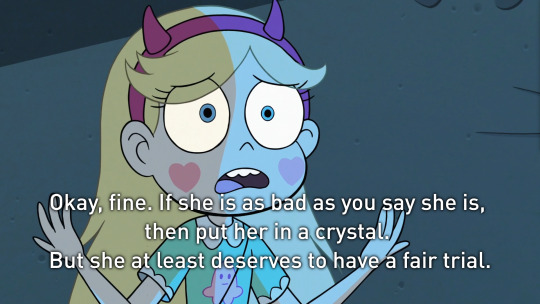
There’s also the curious case of the sleeping portals. Once again, Star confronts the problem, but taking Eclipsa’s advice to just let herself go and see what happens almost gets her hunted down by Hekapoo. It takes Marco’s secret assistance in Night Life and their final expedition in Deep Dive to stop the portaling. The Realm of Magic is a whole separate issue, one which the show hasn’t fully covered, so I can’t clearly say she “solved” that. But the immediate problem at hand was actually more or less solved for real, so this is sort of a sped-up microcosm of Star’s character arc.
You all deserve a breather, so have a wholesome bug hug.
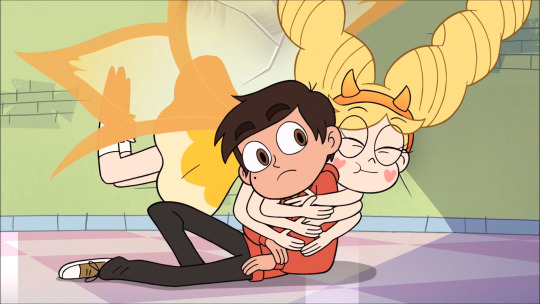
And finally, we have the issue of monster rights. This kickstarts in Starfari where Star explores the injustices against monsterkind on Mewni: Moon is unhelpful, Jelly Goodwell is a nutjob, and Star’s takeaway from it is to appoint Buff Frog to an ambassador role of sorts. A noble and well-intentioned idea with some actual thought put into it, but one which doesn’t really address the roots of the issue (as we’ll see when it eventually fails in Is Another Mystery).
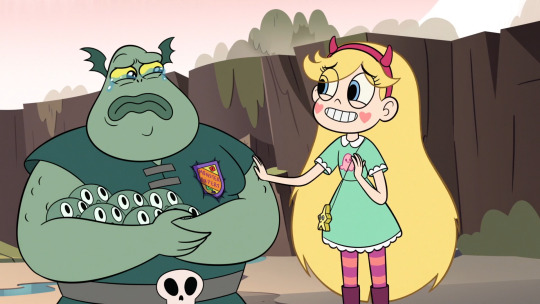
Monster Bash (and the treaty in Death Peck) are similar cases where Star thinks that channeling her passion and drive will make everything work, but it doesn’t – hard work and idealism aren’t always enough to get the job done, and can’t quite combat centuries of ingrained prejudices.
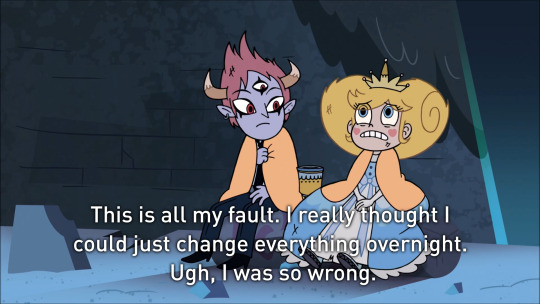
This is sort of a turning point where all her rushjobs start to collapse on her head. If you somehow don’t believe me that this is the crux of all of her problems now, let the show itself tell you even more directly than in Fetch.
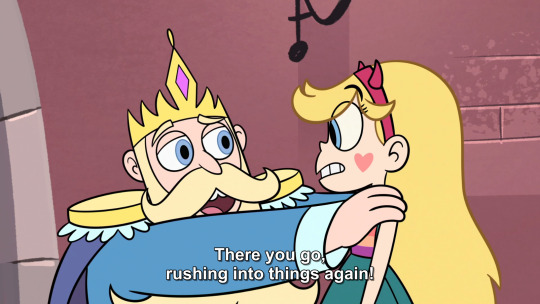
She finds out the injustice against Eclipsa is so much bigger than she could have imagined, Buff Frog leaves Mewni, Booth Buddies floors her with the revelation that their friendship/princess-squire relationship isn’t perfect like she thought it was, and she even finds out her birthright to the throne isn’t even legitimate! And in each and every case her next step is to say, essentially, “Well clearly my initial, rushed approach didn’t work. What now?” And that question doesn’t get thoroughly answered within season 3 in every case, but we can identify some key progress made.
Monster rights is one where not much happens, but we get a hint in Is Another Mystery about it becoming more relevant in the future. She’s learned her lesson with rushing in this specific case already, so Star should have a better head on her shoulders to try and make things right in the future.
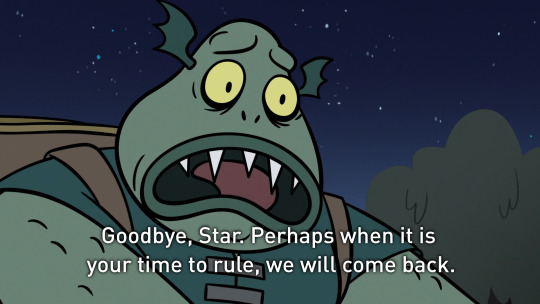
Marco makes his return in Divide after being mildly absent to make way for the 20 billion other things crammed into 3B. Although stuff like Moon going missing has kept Star from dwelling on her feelings for Marco or Tom, she’s wearing her heart on her cheeks (in a different way than usual)
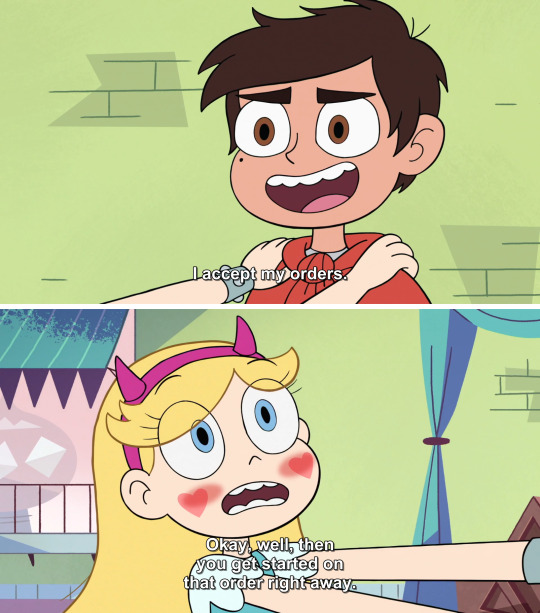
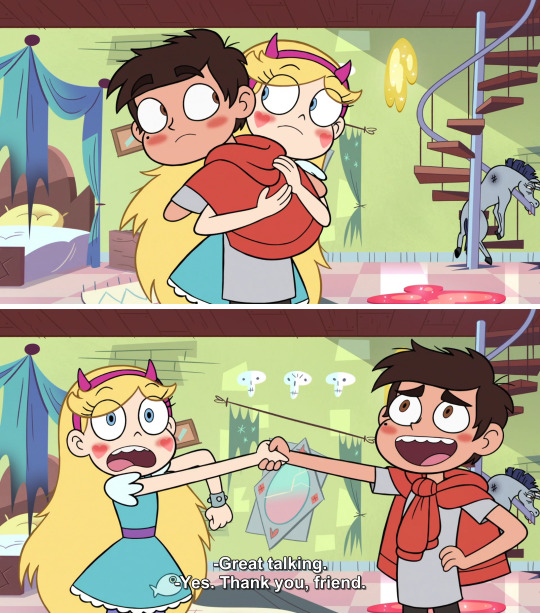
…and again in Conquer, where those feelings manifest as soul-crushing despair with his balloonifying (much like that which Star was feeling with monster rights, with her mom being gone, and with Meteora) and sheer joy when he returns.
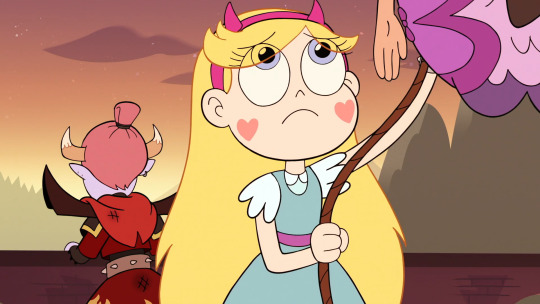
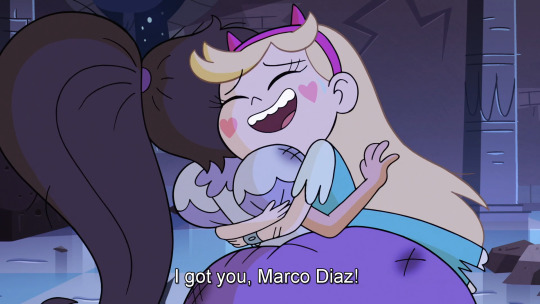
It’s clear that her feelings for Marco are back in full, without any trepidation, and the only thing she needs is a moment to think about it when her or her loved ones’ lives aren’t in imminent danger.
At the tail end of Conquer, the whole issue with Eclipsa and her lineage comes to a head when she gives up the wand. Star sees herself as finally righting the wrong of how Eclipsa was treated – while it’s not entirely certain, however, it seems like she only really thinks she’s giving up the wand.
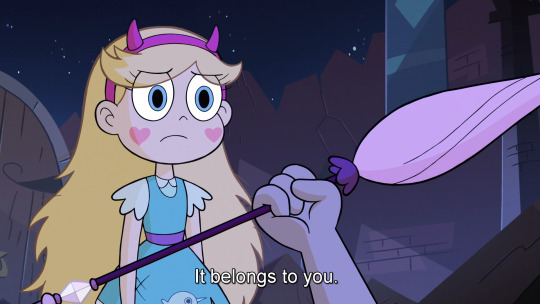
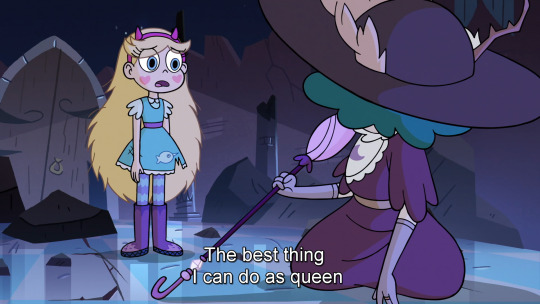
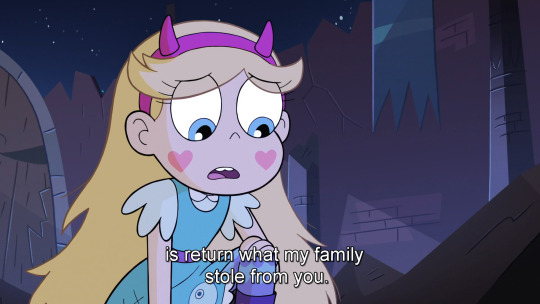
Eclipsa getting her daughter back and going to find her husband came as a surprise with potentially ominous consequences. And that’s where Star ends the season.
I’ll save the recap for those who opted to skip this whole shebang. So with that, let’s jump into the final section.
Season 4 – Inexperience/Efficacy and Stability
Hello everyone just joining us from your app or browser’s “find in page” option, welcome to this post. You missed a bug hug, shame on you. I’m opening this with a recap of Star’s character at the end of season 3:
She has failed at bringing monster equality to Mewni, but understands the flaws in her efforts before and should have a much better mindset to bring about the proper change. Her feelings for Marco are 100% back and stronger than ever, simply awaiting a calm moment to reflect on them, and she rectified the injustice of the throne by giving up the wand to Eclipsa (with foreboding implications).
This was all the info we had until a certain SDCC clip from season 4 was revealed just a few days ago. I’ll be truly brazen for the first time in this post and unshackle myself from the hilariously short chain binding my analysis to already-aired canon. I believe this two minute clip gives us most of the information we need to predict Star’s broad character arc for the rest of the show, and this is my explanation and attempt at justification for my theory.
Clearly there’s a ton of context we don’t have yet, but there is some concrete information present in the clip. Moon is still missing, which is expected and obviously a very important plot point but not directly tied in to Star’s individual character arc (that we know of). Eclipsa being queen, on the other hand, is massive. We don’t exactly know the details, but one way or another, this prison torturer and his prisoner both accept that their ruler is Eclipsa right now. Star is still called a princess by the torturer, so it doesn’t necessarily seem like she’s been disowned, but she’s not actively in charge. And while many people thought Star would be queen for a large part of the season (myself included), it potentially makes a lot more sense for her own personal growth that she isn’t.
All three past seasons, and her three arcs have essentially been Star maturing on her path to being ready for the throne. Star’s far from perfect, but the fundamental flaws in her attitude about her role have mostly been covered. She knows what the problems are, is genuinely dedicated to fixing them, and has (or is prepared to have) a healthier and more patient mindset in tackling them now. If she became Queen… what exactly would there be left? SVTFOE is a heavily character-driven show, where plot doesn’t just drop from the sky and push the characters around and arbitrarily force character growth. The wand cleaving, Toffee/Ludo taking power in BFM, and Eclipsa getting the wand (and likely the throne) are all consequences, in large part, of Star’s actions.
If even a wandless Star was put in power, there’s nothing that stands out about her mindset that would lend itself to a season’s worth of impeding monster equality. If Star had the awareness, determination, wisdom, and efficacy to achieve her goals, the only things stopping her from “ruling Mewni her way” would be the passage of time, bureaucratic red tape, or enemies appearing out of thin air - none of which fit the show’s focus on character-driven plot. Even when she was the recognized legitimate princess trying to change the system from inside, it wasn’t all that effective, so one could argue she never really had the power to enact lasting change anyway.
(As a slight aside, Eclipsa being in power presents a lot of cool opportunities for Star and for the show – Eclipsa spent most of the season as a sketchy character, but one who was consistently pitted against the obviously unfair “system”. Neither the audience nor Star has actually gotten to see her in a vacuum, and a lot of neat plotlines could happen off of that.)
Technically we haven’t seen it in action yet in season 4, but even when Eclipsa officially gets the throne, I should hope it’s fairly obvious that Star is still going to want to act for the betterment of Mewni. Is Another Mystery and Conquer had strong moments of Star asserting her desire to protect monster rights and the people of Mewni in general, despite her already knowing she wasn’t a blood relative of the original Butterflies. So essentially, when the labels defining Star’s role on Mewni are broken down, she still takes all of this on as a personal choice, because it’s what her heart is telling her is right. Remember that last sentence.
I can’t call anything about specifics, but my conclusion here is that Star’s character arc for the final season is essentially using all of the growth she’s had thus far to rise up to the challenge and truly earn her destiny (figuratively and now quite literally). Plot would be much less driven by Star consistently screwing up on a fundamental level, and more about tackling the remaining consequences of her past screwups and learning through experience how to truly “rule Mewni her own way”. Just because I say she has largely matured doesn’t mean she’s perfect - simply having the maturity required for a good ruler doesn’t automatically qualify Star as a “finished” character, because her endgame as Queen must have some authority and permanence to it. Even if Star was in power now, we’d need to see her maturity actually take effect to confirm when the curtains close on this show forever that a “happily ever after” is in place (and having her not in power, at least temporarily, gives way more weight to the consequences of Star’s past actions and allows for more conflict). And if she’s constantly making things worse via her own personal flaws until episode 18, there’s no way she can actually achieve that happy ending.
If you know anything about me by now, you should know what topic is coming next. As I hopefully have established about 66.7 times throughout this piece, Star’s character arc always applies across all of her relationships and interactions in sync, so how does Marco fit in? Star has essentially gained all the internal maturity needed to start the process of becoming an effective ruler. At the same time, she’s essentially gained all the understanding of her own feelings, gone through ups and downs and knows in her heart that Marco is the one she wants as a partner in life and in love. I said above that all she needs is a moment to contemplate it to become fully conscious of her feelings (which would then result very quickly in the Tomstar breakup and a Starco talk). And guess what?
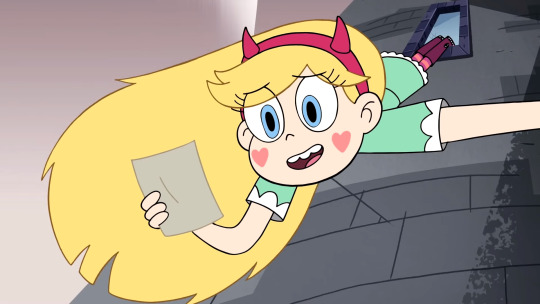
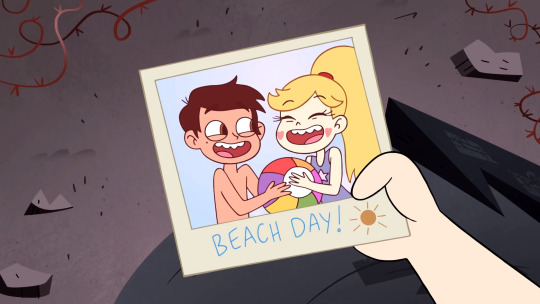
It’s already almost certain that the clip is from very early in the season (otherwise it’d spoil too much context) but there’s even some possible evidence it’s from the first episode of the season. Couple that with the previous importance of the Beach Day photo and you have a recipe for Star’s full realization happening very early on.(Additionally – and this is just my own pure speculation, so take it with a grain of salt – while we can’t say for sure the SDCC clip is from the beginning of a segment, we can also almost guarantee it’s not at the end of it from the general context of the clip. And it would be highly uncharacteristic for the show to linger on an important moment/symbol earlier on in a segment without having that be relevant to the segment itself, which gives me strong impressions that this segment may actually be where something important happens for Starco.)
Need more evidence stacked up for the immediate future of Starco? Like I said earlier, Star’s attachment to the “princess” label as a genuine attempt to help Mewni mirrors her attachment to Marco’s “squire” label as a genuine attempt to have him as a life partner. And that princess label got broken down, but she still did - and will almost certainly continue to - fight for bettering the kingdom. Is it so wrong to guess that, since the “squire” label (and even, to an extent, the entire concept of their relationship as purely platonic) clearly were nuked immediately following the kiss, Star will similarly open the season accepting Marco fully as her life partner without restraint? I don’t think it is, and therefore will claim that Star and Marco will start the season accepting their romantic feelings for each other (and the change in their relationship as a result) just as Star is doing for her role in the kingdom. Maybe they don’t call it “dating” until a handful of episodes later, but any hesitancy in figuring out and tackling the fact that she loves Marco for more than an individual segment focused on it would betray all the growth she’s gone through, just like being hesitant to continue striving to help Mewni would betray her growth. When the labels defining Star’s role on Mewni relationship with Marco are broken down, she still takes all of this on as a personal choice, because it’s what her heart is telling her is right.
Jumping to the endgame now - just like that maturity isn’t enough for Star’s queenly endgame, this isn’t enough for Starco’s endgame either. Star’s almost certain future as Queen of Mewni is a serious thing, and a serious commitment for Marco to make even if they have feelings for each other/are dating. Once again, a mirror to her princess arc can be found – if they keep screwing stuff up in the fundamental nature of relationship with their own flaws and doubts, there’s no way to dig out of that hole cleanly for that happy ending, so it’s gotta start sooner rather than later. Plus we already know that Marco’s arc is essentially coming out of his shell and finding his place in life (read the Seddm masterpost for way more in-depth info on that), so it’s apparent that a rock-solid endgame for Starco requires clarity that the two of them are prepared for everything a permanent romantic relationship means. In essence, we need to see the growth that lead to their mutual feelings applied practically, just like we need to see that for Star’s role within Mewni.
TL;DR Star’s season 4 arc will focus on applying her awareness, determination, and wisdom gained from the past 3 seasons to tackle the consequences of her past decisions, starting from a point of making the personal choice to embrace both her desire to help Mewni and her love for Marco, and through this she will both earn her place as permanent and effective ruler of Mewni, and develop her relationship with Marco into one that will confidently last forever. She’s gonna damn well earn that happily ever after.
There’s certainly a level of speculation to all of this, of course, but I have confidence in the requirements for endgame, so the general path seems clear enough to me. Naysayers on any side of the shipping war make claims that Star and Marco won’t get together for a long time, that the feelings are still uncertain, maybe that they’re not even endgame at all. If you’re a Starco fan that thinks this, then it’s likely that the whiplash of 3A was like a bad breakup that makes you never want to date again. I feel you, I really do, but it had its purpose. Don’t get yourself down that Starco is all a bait just because it didn’t happen one particular time that Star said Marco looked cute. As for anyone else, first off, thanks for sticking around this far! I honestly didn’t expect that! This post doesn’t attempt to shoulder the ambitious burden of convincing you why Starco is good on a philosophical level (my brutally honest response is “fix your eyeballs and earholes and watch the fucking show”), but at the very least I hoped I’ve made a strong claim for all of the connections in the past three seasons and how it will tie together in the fourth and final season of this show.
313 notes
·
View notes
Text
Subject: Oregon Intervention From: Ty S - Oregonian Date: 24 Nov 2020 To: the new Biden Administration Attention - the honorable Cedric Richmond Senior Advisor to the President Greetings elected officials, diplomats, and honorable people, Last time I wrote my elected officials it was under a circumstance of distress. I'm pleased to say that my experience with that situation was resolved with the help and assistance of some good people in public service. I dont write these letters often because Im often not feeling up to putting the kind of energy it requires to express the situation in terms that are solution oriented. But I seek solution oriented strategies often to remedy strife and stress that people in my community live with. It appears to be a time once again to update on the latest issue that we need serious intervention. My name is Ty S I live in Portland Oregon with my wife and son. The experiences as a high school student was quintessential to a Black man growing up in Oregon but my story is unorthodox. My trajectory in education was similar to phil knight of nike as I share two of the four schools he attended: Cleveland High and U of O. So Im as Oregon as the swoosh, Powells, and the Rudolph sign. Politics is my life mostly having been involved in the Oregon students of color coalition and OSA in 2004 and Urban League in 2009 before going on to serve in the Oregon Health Authorities Transformation Center and the Oregon Advocacy Commissions. I'm particularly proud of my community organizing in the between 2004-2016 which includes electing Obama, helping Black Activist run for office, and building a grassroots community health worker project called We Are Health Movement. Once Trump came to power things changed dramatically for the worse in Oregon. Nearly all of my activism ended as a powerful racist insurgency became more visibly violent and threatening to the Black community. Events of Portland Oregon 2020 require intense analysis. Im not a total alarmist about our situation like our media has gaslit and painted Oregon as a place on fire with leftist anarchists extremists. Please recognize that intervention can only be settled diplomatically at this point. We have lived and walked and witnessed a very violent escalation since 2016. Look at the evidence of tracking hate crimes in our state https://www.splcenter.org/hate-map?year=2016&state=OR . We should not be on this list. We have such a small populations of minorities including Black, Hispanic, Asian and Native populations and the many immigrant cultures are very small in overall numbers. The story behind these hate crimes is a way more then just isolated incidents there is a large scale and spreading networks of organizations that only purpose is to antagonize, disrupts, hate, punish and resort to violent intimidation and terrorism. Hate groups in Oregon have dramatically grown in the last four years and as a political, social, and defensive response people have responded in a counter activity to keep those movements from growing further and pledge to end their reign of terror. It started in mid 2016 when Jeremy Christian a pre-radicalized activist with the Proud Boys murdered in 2 people on the Max Transit system (which is like our rail car). Jeremy Christian is part a new movement of internet organizers that have particularly recruited young white men to organizations like the oath keepers, 3 percenters, and inspired by the Bundy occupation movement of 2016. They are living in the shadows of Waco movement. Out west they love that shit and 2016 opened the door for growth of these right wing extremism. Oregon responded initially in Portland by counter protesting against the groups that would gather in various parts of the city including on the Federal freeway 213, Downtowns Terry Shrunk Plaza, and Tom Macall Park. Each of the events in the summer of 2016 organized by violent right wing extremists involved heavy confrontation from counter protesters. This included verbal, physical, and organized violence. This was warfare in a small scale. But many things escalated. This history must include a contextualization of the types of organizations that began to sprout and grow on the opposition which I will categorize as the organized left until I describe it more fully. In Portland initially the ecumenical faith community, the non-profit activists, labor, and a variety of socialist organizations. Some of this coalition of organizations had previously collaborated against neoNazis in the 80s as resistance to hate before. The events of Jeremy Christian galvanized a large scale opposition that sought to resist racialized terrorism of that kind in our community. As events and confrontations continued to persist summer after summer after summer we are now where we are today. As the events continued the city of Portland often utilized the Portland Police Bureau as a referee of sorts to prevent wide scale violence. But there were many instances where people of Portland felt that Portland Police were more favorably protecting the right wing groups more and more the activists involved from the left lost favor with the city government, Police leadership and elected such as Ted Wheeler. The impasse really escalated between the city representatives and diplomats in political actions, contract negotiations for the police union contracted are included as a source of the strain and political tensions escalating. The summer of 2020 was by far the most chaotic situation because the global movement for justice for George Floyd and Briana Taylor tied with Oregons #BLM picked up a new confrontation with the Police and state officers in downtown Portland. Oregon activists like many other states have been fighting for justice for many unarmed black men and women and those with mental illness shot and killed by the Portland, Vancouver, and Gresham police. Local movements converged it was a mashing of black activism in a new generation of young and emerging people for Black Lives with the Oregon defenders and anti fascists who had basically been in battle with right wing extremists continuously for 4 years. The combination produced energy seen no where else in the country. The City saw had over 130 days of continuous protest in a call for anti racism, justice for police murders, and anti capitalism oppression. Now I do not need to detail all of these events and how they were organized and what happened between the night to night. I do know that a lot has happened and most documenting and historicizing these events can tell that story. My purpose today is explain that there is a diplomatic intervention needed. We are desperate in this city for a focus of attention that doesn't involve us looking down the dark hole of a barrel. There needs to be a peace tribunal set up in our city (similar to south africa). The need is so great out here. No convening, No conversations, Nothing seems to be working. Please help us out here and we don't need photo ops, only real commitment and work can solve anything we got out here. The pain is deep and the grievances are so numerous that our community might not heal for a generation. We need peace in this city. We need peace. Peace between police and protesters and between the right wingers. There are some clear changes needed. Here are my suggestions that will give people a part of power. Total and complete overhaul of the law enforcement in this country in the first step we must examine. The Portland Police contract needs a total revamp. All of there leadership needs to be changed. There is a certain segment of Portland that wont setter for less. The many proposals by thousands of activist in portland none of which has happened in the more then 4 years of advocacy: https://www.portlandmercury.com/blogtown/2020/06/09/28519183/all-of-the-... We need to accelerate these changes locally and nation wide. We are not an outlier here it is part and parcel of similar movements that started in Furgeson. Even if you or your office got involved and moved the needle on any of these issues Portland still will need to grapple with its right wing violent extremism problem, because it is growing out of control with reports of continuous recruitment in the suburbarbs and nationwide show this. Oregon is the theater of a national program targeting this state as battle ground for the clash of extreme ideologies. What should we do about that? Well my feel is that its not important to most law enforcement or it really feels like it. The law cant really keep up with the type of warfare that is just as much virtual as it is physically in the streets. It will have to be part of a robust strategic initiative on a large scale organized nationally coordinated and well resourced. No longer can cities afford to build volunteer resistances to hate groups. There needs to be a common societal agreement on this in a new contract of acceptance of what is right and wrong in our communities. It is appropriate but it will also need alternative opportunities to get people out of those groups. Violence is not ended here and we expect next year will be worse then this one and we live in fear for our lives. Black people in particular fear that violence is eminent in any outing, they must use precautions to protect themselves in this kind of violent political and social environment because your skin tone and or your social status is often the determinant factor. Hate crimes need national attention to end. We need a nation wide movement to end racism. Many of the right wing extremists are entrenched in their ideology and need an counter narrative that is stronger to inject alternative perspectives. But it might be too late for that here in Oregon we are at the point where violence and counter violence are yearly occurrences and it becomes a matter of desperation to even reach out to the federal government for help and support. Oregon is my home that I spent most this year has required a high level of alertness and protection of my home and family. This is the first year we have seriously discussed leaving the United States because really feel unsafe for us to live here and thrive. I hope this country can do something about our situation with both Policing and Hate before we dissolve into non stop tribal warfare and violence. This call to action and support will go to the high courts of international conflict. Please help me forward this letter to leaders of every civil society.
0 notes
Note
I heard this theory that something about Tom and star staying together, just so monster and mewman can live together in peace, considering they’re “monster and mewman” couples(Is Another Mystery) and also to support eclipsa and her husband supposedly, and another theory of them (Tom and star) being parallel to monster love too,and etc. personally I don’t believe this theory to be possible but what do you think? And my apologies for asking you this dumb question
OK, so first off I’m presuming that the multiple “but X said this, can Starco still happen?” asks I’m getting are the same anon. This is likely the last ask I will field about this and if I keep getting them I’ll disable Anonymous asking, as my many, many words on the subject should speak for themselves.
-Ngame, July 25, 2018
Next one makes me check the box in my blog settings. I know there’s no malice in these asks I’m getting, but I can’t help but see this as “but wait, Ngame, I know all the facts about climate change and I’ve studied the science behind it, but some guy I know said it was cold this week! does this mean it’s not real??? help!!” and I’m very quickly running out of meaningful things to say.
Tom’s speech in Is Another Mystery, while certainly meaningful to his character development, short-circuits every Tom fangirl’s brain. Tom has never been a discriminated common monster, he’s an accepted royal, and no one has had any prejudiced reactions to Tom and Star’s relationship in or out of the other royal families. There has not been a single other moment of parallel between those relationships, and if anything it’s the opposite since Tom was tied to her “being a better princess” mentality at the beginning of 3A, which makes him the more “traditional” choice as opposed to the rebellious one. Plus Marco has consistently been the one more concerned with the mistreatment of monsters since even before Star herself in Season 1.
It’s great that Tom steps up in this moment to defend Star and finally has some genuine concern for the problems other monsters face, I’m not discounting the importance of his speech to him. But it boggles my mind that anyone would treat 60 seconds of words out of a confused, insecure supporting character teenager’s mouth - words that literally didn’t convince their intended recipients, mind you - as the show’s dogma while ignoring literally everything else the show itself tries to tell you including the rest of the context in that exact scene. Considering those people see this show as “Tom vs. the Forces of Not Everyone Worshiping Him Like He Deserves Because He’s Changed™ Goddammit He Has Earned Star As His Prize” it probably shouldn’t surprise me, though.
Plus, this isn’t exactly new - to this day I’ve seen people who still think that Marco’s speech about getting to know Jackie better in Sleepover was actually the show proclaiming that that would be a crucial story arc and that the writers objectively failed by not doing that. As opposed to, y’know, it just being Marco saying what he thought he wanted at the time, and his lack of following up on it being an important sign that he didn’t really know what his heart truly wanted, which was the critical kickstarter to his season 3 growth. This is the point where I remind everyone that this show is meant to be accessible to literal children, with single-digit ages. God help us all.
What confuses me most, though, is that anyone who isn’t viewing the show through a viscous facial coating of a specific demon bodily fluid would give any credence to these “””theories””” whatsoever. There are certainly some reasonable concerns to have with the show and its future, I’m not blindly charging into the future brazenly sure that literally everything will be perfect, but c’mon now guys. I get it, I really do, you’re worried because 3A gave mood whiplash at the beginning (even though Marco returned in three episodes and instantly became the most important person to Star again). But the show itself is too painfully clear on all of this, and if you somehow aren’t picking up on that yourself then there are literally hundreds of pages of analysis where Seddm, myself, or others strap you in a stroller and go through a leisurely walk through the SVTFOE park with mountains of evidence. You shouldn’t need us to hold your hand and tell you it’s gonna be alright, and if for whatever reason you do we already did, repeatedly, both directly and indirectly.
20 notes
·
View notes
Text
My Attitude/Pessimism Toward Marvel
I’m tired but can’t sleep. That means writing a post about Polaris and my general pessimism toward Marvel.
I’m putting this behind a cut because I know some people out there don’t want to see it, and I won’t push it on them when they search. Others have probably seen it over and over and are sick to death of seeing it. Here I go.
I’m extremely pessimistic about Marvel these days. I expect a mix of nothing, backhanded/sabotaged use, and empty gestures that function in the most technical sense possible but don’t actually amount to anything.
Preface: when I note a specific person, do not harass them. I am not just saying this. I mean it. Harassment is bad. It sucks. Don’t do it.
Introduction to Marvel
I learned about Polaris in 2009. I’ve been putting up with Marvel’s behavior for the past 8 years. I’m jaded and pissed off.
When I discovered her, it was at the precise moment when Marvel was shutting down the good things going for her and trying to discard her in space. I loved Jeff Parker’s Exiles run. They abruptly shut it down after six issues; Jeff Parker even had most of a script for issue #7 done when they did it. I loved Lorna’s presence in the Wolverine and the X-Men cartoon. They abruptly canceled it after one season, despite the team having plans as far out as season 3.
My introduction to Marvel’s attitude toward her was already on a sour note. In spite of it, I entered into Marvel with optimism. I naively thought that perhaps with enough positivity and shows of support, things would change.
But then I got to Tom Brevoort. Presently Senior Vice President of Publishing.
Introduction to Editorial/Executive Individuals
Back around 2012, Brevoort was very openly negative toward Polaris. When the matter of Lorna’s parentage came out, he was more than happy to try to claim Lorna couldn’t possibly be Magneto’s daughter, yet somehow Siryn could be Banshee’s daughter, with some convoluted excuse about “genetics breeding true.” When someone asked about Polaris possibly being in the Avengers vs X-Men event, his response was to say that Lorna couldn’t be part of it because “events are only for A-listers and B-listers.” Meaning he blew off any potential value she could have to the story, and looked down on her as a “lesser” character.
This is in addition to Brevoort bending over backwards to exclude her from family events in things like Children’s Crusade.
My first experience with someone at Marvel in an editorial/executive role was someone who had nothing but contempt for my favorite character and looked for any excuses he could find to devalue her and exclude her from anything he could.
Handling Lorna’s Return From Space
At the time I got into her, Marvel comics had Lorna shoved into space, same with Rachel Summers and Havok. You know how important they seemed to see her? They kept her in space limbo for a year. A full year lost, because according to what I’ve read, the X-Men and space offices didn’t know who had control of the characters.
Think about that. If this was someone like Wolverine or Storm, they would’ve been on top of making sure who could use them. Instead, they cared so little that they spent a year just letting her hang with no writers able to use her.
When they did finally bring her back? They shoved her back onto X-Factor.
X-Factor
Now, a lot of people love X-Factor, and they love Peter David. I understand that. I had a volatile start here, and if I’m completely honest, I didn’t give Peter David a fair shot before judging at the time. But I need to explain why I was volatile over this.
Polaris was in X-Factor in the 90s. She had a lot of major development afterward. She joined her father Magneto and her step-siblings on Genosha, developing her powers, gaining vital skills, building a reputation. She survived the genocide and dealt with trauma afterward. She lost her powers from Scarlet Witch stripping them from her. Got them back when Apocalypse forced her to become Pestilence. She went through Hell.
... Then Marvel decided to kick her back down to where she was before all of that development. They shoved her back on her old 90s team. Forced her to remain Havok’s supporting girlfriend. The reveal cover even had her standing behind Havok to drive this point home.
To me, it felt like a symbolic “fuck you” to everything Lorna suffered through, all the growth she had, all the ways she established her own character.
This was my first experience with, in my eyes, Marvel technically fulfilling something I and other fans wanted while undermining it. Fans wanted her back from space. They brought her back from space... then put her on a book that at first glance turned back the clock on all her development, and with a writer who is deeply opposed to characters he’s writing being involved in crossovers and broader Marvel events if he can help it.
Marvel traded exile in space for exile on X-Factor. They didn’t solve the problem. They just changed where the problem existed.
But like I said. I don’t think I gave Peter David a fair shot at the time. He did do some good things.
Sabotaged Milestones
I want to note going into this that I had some major problems with some of Peter David’s writing. I was very upset when he wrote Lorna saying he could do without seeing her father for the rest of her life; giving Marvel an excuse to never use that relationship. All-New X-Factor #3-6 also treated Lorna very, very poorly. It lacked empathy in writing her “rage” moments, and undermined her leadership to make Gambit look better.
I wanted to get that out of the way for context.
X-Factor #243 told Lorna’s origin story. She’d gone over 40 years without it being told. And it was good! Much better than I expected.
All-New X-Factor let Lorna lead a team in her own right! It also took over 40 years to happen. Until then, she only got to be “replacement leader” for other characters’ absences.
All-New X-Factor in general let her interact with Quicksilver, and #14 let her interact with Scarlet Witch! It was the first time she got to spend time with her siblings in around 10 years.
... And Marvel refused to promote any of it.
Marvel did nothing to promote Lorna’s origin story getting told after 40 years of Marvel never telling it. They didn’t promote ANXF at all. When ANXF #14 was coming out, they went so far in trying to keep people from knowing about it that they withheld its cover until a week before release. Too late for most people to order it. Not to mention it was the second issue of a double shipping month.
But wait. It doesn’t just stop there. It also goes into Marvel trying to use attributes of Lorna while refusing to actually use Lorna herself.
“Replacing” Lorna, Not Using Her
At the same time as ANXF #14′s release, Marvel had promoted Axis with a cover months in advance of Scarlet Witch paired with Enchantress, with Wanda’s hair tinted red and Enchantress’ hair tinted green. So basically? While Marvel tried to bury ANXF #14 happening, they tried to exploit the visual of Lorna and Wanda to sell more copies of Axis.
Then, after Axis forced a retcon that made Scarlet Witch and Quicksilver suddenly not Magneto’s kids anymore, Marvel decided to do something else dickish. They created a character called Luminous, to be a “sister” to Wanda and Pietro.
That’s not one, but two times Marvel - mainly the Avengers side, meaning most likely Brevoort - tried to replace Lorna instead of actually using her. One, a character they saw as “more worthy,” and another brand new character they created for the sole purpose of occupying the role she had. That’s how much Marvel looked down on Lorna: they decided they’d rather create a character than use her.
Forced Limbo
Marvel canceled All-New X-Factor “due to low sales.” Notably, when they put out the Scarlet Witch solo, they let that book last for a year despite having sales just as low starting with issue #2.
The last time we saw Lorna in anything before her return this year was Secret Wars in 2015. At the time, I was excited. She was going to be able to interact with her father. Her broad family ties were acknowledged with Secret Wars: House of M. Various alternate reality versions of her had cameos.
I started dreading that Marvel doing so much for her all at once was a sign they planned to throw her into limbo afterward, and this was just to smooth things over before they did. I kept it to myself though because I wanted to believe Marvel intended to do better by her from that point onward.
Except I was right.
For two years, Marvel kept her in forced limbo. No appearances. No cameos. Nothing. The absolute most she got in that time was Sabretooth talking about how she smelled. Marvel looked at interest in Lorna, and for two years said “Fuck her, let’s use literally anyone else.”
Oh, but she’s back now, so it’s all fine! Right?
No. It’s not.
Beneath Men On Return (X-Men Blue)
Her first appearance this year was an alternate future in Deadpool and the Mercs for Money. There, she wore an all green costume with Magneto’s helmet and Magneto’s chest element. At the time, I made the mistake of supporting it. I should have seen and treated it as a bad omen of things to come.
When she finally got re-introduced with X-Men Blue #8 and #9, I was pretty damned jaded by Marvel. After everything I explained above, after two years of forced limbo, I expected she would briefly appear and then get thrown back into forced limbo. It turns out, how she’s been written and still being written makes me wish Bunn would stop writing her.
X-Men Blue #8 spends a ton of time building up Havok. He gets to be a threat to the teen X-Men. He gets to lead a brand new team of his own. He gets to interact with Briar Raleigh and get introduced as working with Emma Frost. He gets to establish connections. He gets all of this.
Then Polaris gets introduced. And how is she introduced? With dialogue exclusively emphasizing that Havok is her ex. And a description text box that describes as only one thing: “Daughter of Magneto.”
Think about that. Imagine Havok bursts into a room Polaris is in and all he says is “I know you were my girlfriend, but I won’t let my feelings for you hold me back.” Imagine Magneto shows up, and the only thing Marvel thinks you should know about him is “Father of Polaris.” Nothing else.
X-Men Blue #9 proceeds to reinforce this. It takes great pains to re-frame Lorna’s long-held “Mistress of Magnetism” title into looking like something she’s only allowed to have because Magneto is her father. When Lorna uses her powers to make two team members leave, one of them says it’s a sign she’s definitely Magneto’s daughter.
Because, y’know, a silly woman like Polaris couldn’t possibly want to do that of her own accord. It must be because of her daddy. Right?
Then, in a future issue (I think the next one), Bunn writes Lorna acting surprised by an attack on the team’s base - just so he can write Magneto “correcting” her about how attacks can come at any moment.
This is Polaris. A woman who’s been attacked out of nowhere repeatedly for decades. She survived a genocidal massacre that came out of nowhere and killed millions, for fuck’s sake. There’s no way in hell she’s going to not expect an attack while in a base of operations. She wasn’t safe in the heart of Genosha, she’s not going to think a piddling mansion will somehow be safer. I found this very insulting as a whole.
In the latest event, Lorna is put in the Malice costume at one point. Her reaction can be summarized as “Oh wow, this is one weird costume alright! How strange. Oh well.” While the scene is designed to heavily emphasize Mutant Massacre, the horror of dead mutants in the sewers, and Magneto’s outright about it.
Here’s the thing. Malice possessed Lorna and used her body to hurt and kill people, including those she loved. She was a passenger in her own body, forced to witness the horror of it all. For Lorna to have no kind of real reaction at all is insulting. The book plays it like it’s just for fun and thrills and doesn’t care at all about how Lorna would actually behave.
And something that doesn’t help is occasionally forcing dialogue where Lorna says ‘father’ or ‘dad’ in spots that are completely unnatural, just to remind everyone that he’s above her in that fashion. As I write this, I’m trying to remember if I saw Magneto refer to Lorna as “daughter” like this at any point.
The consistent pattern in everything Bunn’s done with Lorna so far is this: “Magneto and Havok are great, Lorna is beneath them and that’s the only value she has as a character.”
Odds and Ends
I’ve said a lot here, but there’s some pieces throughout the years that didn’t fit above.
The X-Men franchise had its anniversary in 2013. Marvel made covers meant to combine into one big image. Polaris was on none of them. Yet, Marvel included Havok alongside four of the original five X-Men on one cover.
In general, Marvel has been forcing Havok into every major development for Lorna while never raising her profile when things happen for Havok. When he went to Uncanny Avengers, the most she came up was unnamed as a “crazy girlfriend” he’s glad to be away from.
Yet, when Lorna’s origin story was told, Havok got to be involved. When Lorna led a team of her own, Havok got to be forced in as spying on her via Quicksilver with the reason being that Havok in sum thinks she’s not smart enough to avoid being taken advantage of by Harrison Snow. And then X-Men Blue, where he got to be the primary focus of what was being played up and promoted as Lorna’s big return after 2 years of forced limbo.
With regard to Avengers vs X-Men, Brevoort did technically relent to include her... as a nameless cameo. Who gets mind-controlled into submission by Emma Frost. And who Magneto completely ignores being treated that way after having gone into space to help rescue Lorna just a month prior.
When Occasional Good Isn’t Enough
As you may be picking up here, Marvel did allow some good things for Lorna during these past 8 years.
She returned from space. Magneto is her father. She got to interact with Wanda and Pietro. She got her origin story told. She got to lead a team of her own. She got her first playable appearances in video games. She got a figurine after a decade without one and lots of fan demand in top 10 lists. Arguably (cause Nix took the initiative to ask to use her), Marvel allowed her to be a star on Gifted, which is the best writing she’s had in a long time.
A person might look at the good stuff she’s managed to get in the past 8 years and think: what’s the deal? Why be pessimistic and negative about Marvel when they’ve done good things for her in that time?
Here’s the thing. Doing the occasional good thing does not undo massive heapings of bad that happen at the same time. If you burn down my house, giving me a brand new car isn’t going to bring my house back, nor is it anything close to a replacement for what I lost.
I’m not “ungrateful,” I just don’t let the rare nice thing from Marvel blind me to all the times they’ve screwed over the character I care about and keep doing it. I don’t let the occasional nice thing make me forget that Marvel’s spent most of her nearly 50 years of existence cheating her out of everything she can be.
My attitude toward Marvel is a reflection of Marvel’s attitude toward what I care about.
Some people are quick to play nice over that occasional good. I see doing so as a mistake. It’s giving Marvel permission to keep treating Lorna poorly as long as they throw a tiny breadcrumb over every so often. I think it’s part of what’s allowed Marvel to hold her back for literal decades. They don’t have to do anything more than the bare minimum if the bare minimum looks like it’s enough for Polaris fans.
Some people are afraid Marvel will at some point “punish” demanding more from Marvel after the occasional good. My stance is this: if Marvel is genuine, if they really want to do right by Lorna, then they’ll try to do right by her no matter what I say. If they try to tear down Lorna for things I’ve said, then they were lying any time they said they support her or that they said they try to be a good writer/editor. At which point they require more criticism and complaint, not less.
This post was long, but necessary for me. I needed to say all this.
14 notes
·
View notes
Text
Thomas Hardy’s The Mayor of Casterbridge and Nintendo’s Animal Crossing show up at the door after an “extended leave of absence.” You make them lead the toast. They don’t know what the party’s for.
Drink of choice: Vacation Juice
You (player) may have more in common with Thomas Hardy’s The Mayor of Casterbridge’s (TMoC) Micheal Henchard than you think. Have you recently gotten drunk on rum soaked oatmeal and sold your wife and child to a passing sailor for five guineas? No? Have you decided to run from your problems and into the warm embrace of leadership and success that is being the mayor of a town? Great! You and Micheal Henchard have an understanding.

One of the best things video games have going for them is the ability to temporarily embody a character in a virtual story. Nintendo’s Animal Crossing series is famous for its unstructured and vague protagonists (human despite the town’s villagers being sentient animals in houses), as well as its domestic, pastoral aesthetics. Though most of the games in this series do not have a set of end goals, the overarching push is to pay off your house loans, better the town, and welcome new residents. Collectible mini-games like catching fish and bugs, as well as buying clothes and furniture, aim to keep the player busy while they raise enough money for projects. For the sake of simplicity, this analysis will focus on Animal Crossing: New Leaf and Animal Crossing: New Horizons (AC: NL / NH).
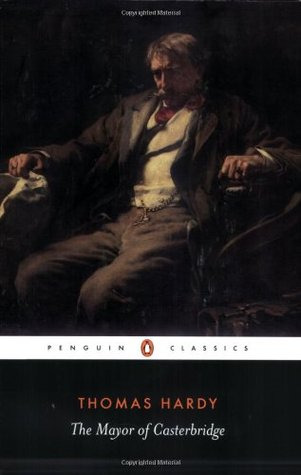
Both TMoC and AC: NL / NH feature protagonists whose pasts are unknown to the new communities they join. Though Henchard works his way up to become mayor, AC’s protagonists are handed the responsibility of revitalizing and gentrifying the land with little to no qualifications (aside from enthusiasm). Both games likewise touch on the relationship between capitalism and personal identity. Henchard’s debts cause him to sell his wife, an action that haunts him into his wealthy new life. AC’s debts exist with the start of the game, as it is impossible to avoid taking out a loan from the business tycoon, Tom Nook, in order to build a home. Once this loan is paid in full, Nook offers an expansion, and then another expansion, and another, until paying it becomes normalized.

Though AC is a stylistically charming and child-friendly game, certain qualities can spark anxiety, stress, and even horror. Ashley Brown’s “Animal Crossing: New Leaf and the Diversity of Horror in Video Games” posits:
[t]he NPCs’ desire and admiration for space and symbolic wealth, combined with the loans involved in house expansions since they cannot be made in cash beforehand and only in credit afterwards, evokes anxiety and create a sense of ineffectualness simultaneously. The goals successful adults are meant to achieve, such as being debt-free homeowners, are always just out of reach. (12)
Torn between funding a new bridge and paying off their never-ending mortgage, the loan becomes an addictive, haunting feature of this series. The capitalist desire for what is bigger and better lures players the same way gambling and drinking lures Henchard into debt. (In fact, a feature new to the AC series allows players to play a stock market of turnips. The prices fluctuate according to day and island, encouraging players to buy turnips up at low prices and wait to sell when the exchange rate is high.)
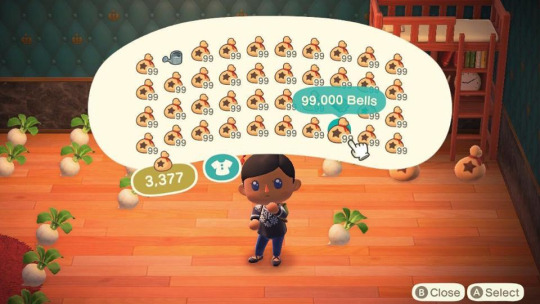
In a sort of manifest destiny or John Lockean philosophy, AC relies on the idea that the natural word and its creatures are available for anyone to catch, kill, or take. Ian Bogost’s “The Quiet Revolution of Animal Crossing” asserts “pastoralism and capitalism coexist perfectly” within the gameplay and game narrative. Unlike past games, AC: NH features the colonization of an uninhabited island. Aside from manicuring, decorating, and even terraforming your island, players are able to visit other uninhabited islands with a Nook Miles Ticket. The Nook Miles Ticket can be purchased only with Tom Nooks reward points. You can earn these points by doing anything from changing your clothes to catching a ton of bugs. The Nook Miles Ticket is intended to provide players an opportunity to pillage a new island of its resources and return home. In this way, the rewards system for gentrifying your island leads to the decimation of another.
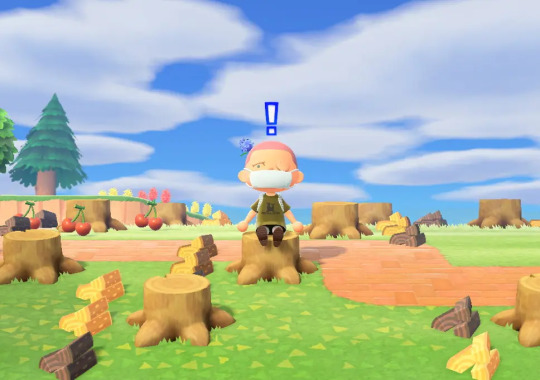
Do you see where I’m going with this? While Henchard certainly doesn’t discover Casterbridge nor pillage a neighboring village for resources, Casterbridge serves as a rural, agricultural hub on the verge of being manufactured. Henchard’s interest and business growth brings wealth to the town, and although that wealth does not last, it and his reputation are enough to attempt to repair his past mistakes. As a “man of character” would do, he asks his ex-wife (who has found him) to remarry. At the same time, a Scotsman on the way to England with great knowledge of his business offers game-changing advice, for which Henchard begs him to come work alongside him. Farfrae (the Scotsman) and Henchard enter a relationship not dissimilar to Tom Nook and the player. Both are entirely tied to the growth of their towns and businesses.

In this way, the development of the town/island in AC and the business in TMoC is more important than character development. The towns, as systems, operate within a structure of authority that place the protagonists at the top. The characters interact with the town capitalistically and with a Lockean philosophy in order to alter it and themselves. For Henchard, this is to become a “man of character.” For AC players, it’s for virtual creation and control. Are not both attempts to have power over a community and reify self-worth? Are we not always trying to recreate ourselves?
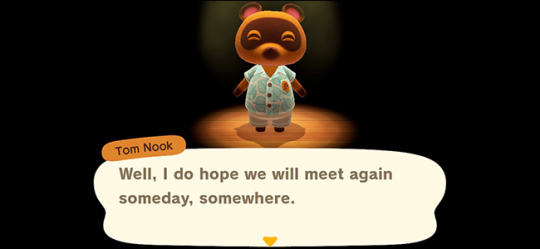
Credits and Sources
Animal Crossing: New Leaf. Nintendo 3DS, 2012.
Animal Crossing: New Horizons. Nintendo Switch, 2020.
Bogost, Ian. “The Quiet Revolution of Animal Crossing.” The Atlantic, 2020.
Brown, Ashley. “Animal Crossing: New Leaf and the Diversity of
Horror in Video Games.” DiGRA, 2015.
Hardy, Thomas. The Mayor of Casterbridge. Penguin Classics, 2003.
Pictures in order of appearance:
1. Joshalynne Finch, https://www.howtogeek.com/664088/how-to-get-started-in-animal-crossing-new-horizons/
2.goodreads.com, https://www.goodreads.com/book/photo/56759.The_Mayor_of_Casterbridge
3. Se7en.ws, https://se7en.ws/animal-crossing-new-horizons-money-grinding-how-to-earn-lots-of-bells-fast/?lang=en
4. Dave Thier, https://www.forbes.com/sites/davidthier/2020/05/03/calculator-lets-face-it-turnip-prices-are-totally-broken-in-animal-crossing-new-horizons/#20ededf462a8
5. Louis Chilton, https://www.independent.co.uk/arts-entertainment/games/feature/animal-crossing-new-horizons-earth-day-nature-acnh-update-nintendo-a9478156.html
6. wikiwand, https://www.wikiwand.com/en/The_Mayor_of_Casterbridge
7. Joshalynne Finch, https://www.howtogeek.com/664195/how-to-restart-your-island-in-animal-crossing-new-horizons/
#gamestudies#animalcrossing#animal crosing new leaf#new horizons#ac: new horizons#themayorofcasterbridge#The mayor of casterbridge#thomashardy#hardy#games criticism#literarystudies#litcrit#capitalism#johnlocke#pastoralism#consumerism
0 notes
Text
10 Things You Need To Know About Beard Transplant

The mere mention of hair transplant, it would be no surprise that you would automatically think of the head on your hair. But did you know that a surgical hair restoration procedure is not limited to filling in your balding head? True, scalp restoration takes up 92% of the total statistics in 2012 according to the International Society of Hair Restoration Surgery 2013 Practice Census Results. However, facial hair transplant, which includes moustache and beard transplant, is also a growing trend accounting for 1.5% of the data.
The Growing Trend of Facial Hair
This could be very well tied with the fact the more and more men are embracing facial hair which has since become a global trend. Gone are the clean-shaven look replaced by the loveable hipster. In a Global News article, Allan Peterkin, a Toronto psychiatrist and author, said that “Worldwide, we are at the height of facial hair.” He even went on to say that it is a “delightful expression of masculinity.”
Also according to the article, the trend seems to be more popular among young professionals who are ditching their smooth appearance to look older and more respectable. Master barber Salvador Chanza from Spain said that, “To grow a beard is to start a new life and to have more confidence in yourself. You look a little older, so people have more respect.”
The growing fondness of facial hair has been linked to the hipster beard trend. Today, there is an increase of male celebrities sporting a more rugged look. Brad Pitt, George Clooney, Ryan Gosling and Tom Selleck are just some of the famous Hollywood references. And of course, it also adds a certain sex appeal to a man.
The Movember Movement
The beard has even spurned an annual event called Movember, which is a portmanteau of the Australian term “mo” for moustache and the word “November”, that encourages men to grow facial hair to raise awareness in men’s health issues. From its humble Australian beginning in Adelaide in 1999, Movember has now grown to a charity foundation, which has raised $95 million in 2012.
What You Need to Know About Beard Transplant
Growing a beard can take a long time. On an average, it takes about two to three weeks before a full beard can be styled or groomed. And for others, growing stubble can be a challenge, while there are also quite a number who cannot grow a beard at all. If you are tired of your clean-shaven look, a beard transplant may be the solution you are looking for. But before you head on to a hair restoration surgeon, here are 10 important things you need to know about beard transplant.
1. Beard transplant is no different than scalp hair transplant
The process and technique that is involved in beard transplant is essentially not any different to that of a scalp hair transplant. It involves the extraction of donor hair on the back or sides of the hair. Your hair surgeon will carefully choose which hair closely matches that of your facial hair. The donor hair will then be carefully transplanted on to the recipient site. However, smaller incisions will be needed compared to a typical hair transplant procedure on the scalp. In some cases, especially for those who have a balding head, donor hair can be extracted from body hair, usually the chest.
2. Hair growth is similar to a facial hair
If you are concerned that your new facial hair will grow like the hair on your head, you don’t need to worry. It will grow just like any facial hair with the same texture and other characteristics. Your hair restoration surgeon will extract the hair grafts that closely match your facial hair.
3. It takes time
The procedure usually takes between two to five hours to complete. This will depend on the area of coverage and the density you want to achieve.
4. Not limited to beards alone
Facial hair transplant is not limited to beards alone. You can have the procedure done to achieve a fuller beard, goatee, moustache or sideburns. Some even get it done to fill in sparse facial hair or patchiness and you can even have the growth pattern that you like. For this, your surgeon will carefully place the donor hair according to proper angle and thickness.
5. Virtually painless
Just like a regular scalp hair transplant, beard transplant is virtually painless. More often than not, beard transplants are performed using the FUE hair transplant technique, which allows the surgeon to cherry-pick the needed hair follicles for the procedure. Because of this, there is no need to make a large incision on the donor site involved in the traditional FUT technique.
6. Reason of getting it varies
While the reasons for getting beard transplant done is mainly aesthetic, it can also be performed to fill in the lack of facial hair growth due to surgical scars or injury.
7. To shave or not to shave
For the first 10 days after the surgery, patients will be advised to refrain from shaving the transplanted hair. During this period, your transplanted hair will look more like stubble and will fall out after two weeks from the date of your procedure. This is a normal stage called the shock phase which will pave the way for new hair growth to start growing through, around the third or fourth month from your surgery date. From then on, you can start growing your beard out for a fuller look or choose to shave it whenever you want.
8. Fewer hair for future hair loss
Beard transplant will involve having to sacrifice some hair on your scalp. This means that you will have less donor hair to address future hair loss in the future with a scalp hair transplant if required.
9. It’s permanent!
Good news is that hair transplant, no matter which part of the body, will yield permanent results. So you do not need to worry about losing your new facial hair.
10. A serious procedure
Just facial hair. No biggie, right? It is still important to understand that it is still a surgical procedure. While extremely rare, risks and complications like infection and scarring on the face can also occur. This can happen because of poor aftercare or choosing an inexperienced hair restoration surgeon.
If you are looking for a credible and board-certified hair transplant surgeon in Australia, Medihair Transplant Clinic will not disappoint. Our resident FUE surgeon Dr Mario Marzola will do an in-depth thorough analysis of your situation and in consultation with you, discuss the desired outcomes and most suitable technique
Please call us today on 1300 355 325 to arrange your free no-obligation consultation.
0 notes
Photo

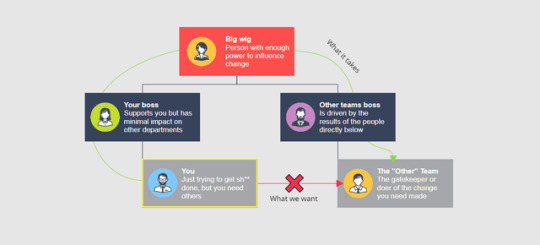

Overcoming Corporate Roadblocks for Enterprise SEO Efficacy
Posted by jaredgardner “You don’t have an SEO strategy problem. You have an organizational efficacy problem.”
That is typically what I tell our new clients at Red Door Interactive (RDI). Poor organizational efficacy can be caused by several things, most commonly a lack of labor, a lack of knowledge, or a lack of senior executive buy-in and direction. Many people would say “efficiency” is a more accurate term than “efficacy,” but I like to remind people that you can do ineffective SEO in a very efficient manner. If the work doesn’t move the needle, then there’s a fatal flaw in your SEO program.
At RDI, we specialize in marketing services for mid to large enterprise clients with annual revenues of our ideal client ranging from $50M/year to $20B/year. The size of clients that we work with have 50+ person marketing departments, and some with more than 1,000. Implementing profitable and evolving SEO programs is much more difficult for non-agile companies and those with marketing that predates the internet. Despite having more resources and built-in topical authority, enterprise SEO can be much harder than SMB SEO — not only because the SEO challenges are greater, but because it introduces another layer of organizational challenges.
What is enterprise SEO? This same question was on a slide at a recent SEO meetup lead by Ratish Naroor , Director of SEO at Overstock.com. Ratish’s opinion of what constitutes enterprise SEO differed from mine in a few areas. Ratish’s main qualification was that the site in question had one million organic landing pages. At RDI, we work with companies that drive hundreds of millions of dollars a year in revenue through organic search. Often these sites have less than 5,000 pages, yet their digital marketing departments are twice the size of many marketing teams at e-commerce-first companies. In my opinion, there’s more to consider than just the number of pages. I like to focus on the organization itself and not the size of its site; organizations whose website is its product take SEO more seriously. E-commerce retailers like Overstock, real estate sites like Zillow, and travel sites like Trip Advisor or Expedia all invest heavily in SEO programs. Many times, “old companies” that have been around 40+ years will have “old management” stakeholders who are a little late to the digital marketing party and more resistant to change. Does this late adoption of SEO and digital marketing make the organization itself any less enterprise? I don’t believe so.
If it’s not just page count that matters, where do you draw the line for “enterprise SEO”? Here’s how I classify it:
Corporate team structure, budgeting, and approval process. There’s no hard number here, but typically 20 or more people are involved in taking web pages from an idea to a 200 status code. Some companies are so lean it will blow you away, so think more than just the total head count.
Organic search as a channel can drive realistic business. SEO isn’t for every company, so it’s crucial that the company can drive top-line revenue growth through organic search.
Unique and difficult SEO challenges. This may include large page counts where scaling on-page changes and crawl control is important, competitive industries where search terms have high paid CPAs, or international SEO operating in multiple languages and countries.
How do you succeed at enterprise SEO? When working with an enterprise organization, there are three major areas to address in order to minimize internal SEO challenges and to see real follow-through in implementing high-value SEO ideas, strategies, and tactics. 1. Create a culture of SEO through visibility SEO can’t succeed in a silo. To get your strategies implemented, you will need full participation and cooperation with content producers, developers, legal, and department heads. It’s important to remember that companies of this size will have an established culture. Sometimes this culture is dysfunctional, and overcoming it will be an uphill battle. Tom Critchlow recently described this culture as a “grain.” The direction and depth of this “grain” is going dictate how much time you spend on this step, and the best way to get people involved is to keep your work visible to the decision makers:
Automated reporting: Focus on showing each team/person metrics they can control
Dev teams: Technical crawl reports with issues such as internal redirects or 404 reports are relevant things that they can control. We like DeepCrawl for crawl reporting.
VPs and directors: High-level performance reports like M/M and Y/Y traffic and conversions give them a bird’s eye view of the site and the effects of your SEO efforts. Tying this data to a dollar figure will help make your case. This can include simple analytics data from Google Analytics, or more advanced tools such as our favorite BI tool, DOMO , or its competitor Tableau .
Product owners/business units: Keyword-level data and traffic to a specific site section that a team works on. An enterprise SEO tool like BrightEdge or Conductor can make these reports easy to manage.
Pro tip: Include the email of the SEO lead on these reports and encourage questions.
Trainings
Many marketers still think SEO is something you sprinkle on at the end of a content project, or “something our IT team handles.” It’s up to you to break down those assumptions and educate their team on the idea that that SEO is symbiotic with every marketing channel and department. These trainings can vary quite a bit, so find what works for the company you are working in/with. We have seen success with the following formats: lunch and learns, video recordings for SEO suites mentioned above, team-specific trainings focused on the area the team controls such as development or content research. While I’d love to say that we turned all the marketers into great SEOs, that’s rarely the case. What we typically see — and are thrilled when it happens — is an email from a product manager that says, “Hey, we are launching a new product next quarter and you mentioned it’s good to do keyword research for new pages; can you help?”
Open brainstorms
Share your knowledge and promote contributions to the program. When I started at RDI 2.5 years ago, our SEO program was good, but it was siloed. We had 3 people working on their own projects for clients and not really collaborating with each other. To share ideas between the (much larger) SEO team and other teams, we started hosting weekly meetings called the “SEO Brainshare.” Each week, one team member picks a topic or challenge and we workshop it with whoever wants to participate. We typically see 5–10 people from other teams at RDI join the meeting, which increases SEO knowledge and keeps our department top of mind. After a year of hosting these meetings religiously, we have seen a large influx in SEO work being incorporated into new and existing client programs, as well as a more multi-channel approach to everything we do at RDI.
2. Teamwork and navigating a political environment
As an agency, we have to be clear with our main point of contact: “You can’t change your SEO results without changing your site. We need you to be the driver of change at your organization. RDI will arm you with the ideas, rationale, and detailed instructions, but you have to get the people in your organization to act.”
While my experience is very agency-focused, in-house SEOs will have to explain a similar scenario to their managers, and the managers of the content, creative, and development teams. The best way to enable yourself for success is make sure you have access to all the players needed for SEO greatness, and they each know what’s at stake and have a certain degree of ownership from their managers. If the product owner doesn’t have a KPI tied to organic traffic or conversions on their pages, it’s highly unlikely they will prioritize and take ownership of organic traffic to those pages.
For a real-world example, I’ve presented challenges and opportunities to Senior VPs and CMOs at Fortune 100 companies where executives have said, “Wow this is a huge opportunity. Why haven’t we done this yet?” and our main client contact responds, “Because XX department hasn’t been tasked with supporting us from their management, so this isn’t their problem.” That’s where the politics really start to come in. You typically need to go high enough up the marketing department ladder to convince someone with power to back your initiative and direct people outside of your department to support you, holding those other people accountable for the results of the team.
3. Don’t get lost in the noise — focus on return This is undoubtedly the hardest to nail. SEO results by nature are highly ambiguous. There is a constant flux of right vs wrong, causation vs correlation, and my least favorite, the best choice between two “good” options. I recently listened to a podcast where Bill Hunt (an OG of SEO, BTW) said, “If you can’t put a dollar number on it, you won’t get a dollar for it.” The hardest thing for me to do as I grew my SEO strategies from local businesses to enterprises was to eliminate SEO busy work. I needed to move away from tasks like updating ALT tags because a crawl tool flagged them as “errors,” and start focusing on projects that would have a monetary impact — like creating new site sections, reworking high-ranking titles for CTR, and consolidating competing content.
There are a few ways to estimate the impact of a fix. Most involve some form of search volume X expected CTR X conversion rate. Here’s the formula in theory:
(Expected click-through rate at current position X search volume for that term) X (conversion rate of site section) = Current non-brand conversions for a keyword
Now you need to see how many non-brand conversions you would get if you achieved the rank you feel is plausible (this is more of an art than science; I like to use the rank of the top competitor as “achievable”): (Expected click-through rate at target position X search volume for that term) X (conversion rate of site section) = Target non-brand conversions for a keyword
Then run a percent change for delta for those two numbers and you have the amount of new conversions for your project.
Ideally you want to do this at scale, since you want to look at more than a single search term for a site change. Here is the excel formula for that:
=IFERROR(B3*(VLOOKUP(G3,’Rank CTR’!A:B,2,0)),0)
For this you’ll need to have a CTR curve table in a table labeled “Rank CTR.” We used the CTR table from AWR for unbranded search , but feel free to use any CTR curve you feel is most accurate for your industry. You can even build upon your own data in Google Search Console.
You will need to do this once for current estimated traffic and again after you have set your target rank numbers, then run a delta to get percent change. (The above formula and CTR curve can be found in the Content Gap Analysis template on our site.)
Working in the agency world, the pressure for our recommendations to have a return is extremely high because those recommendations are measured against the cost of the retainer, even when the project might be something that tends to have a negative impact, like a domain migration. At RDI, the closest thing we have to a secret sauce for this is our Content Gap Analysis . Here’s a sample of how we present findings to clients:
You can grab the Excel template from our site linked above.
They say imitation is the sincerest form of flattery. In the Content Gap Analysis we look at what competitors are doing, then measure the estimated traffic for a topic area. This kind of analysis looks for gaps on our client’s site where competitors have content and we do not. We can examine the likelihood of us being successful in our next content endeavor and to put a number on the estimated traffic a competitor’s site section or page is getting. Once you find opportunities with a forecastable impact, prioritize them in content or site projects and try not to juggle too many balls at once — at least until some content projects have shipped. Don’t forget to quickly communicate the success of a project to accelerate the two factors mentioned above, even if it’s just a quick email with a screenshot from Google/Adobe Analytics.
Focus on the needle-movers and communicate the value of your ideas clearly Enterprise SEO is great because it allows you the opportunity to work on sites with serious impact and serious challenges. Sometimes you must take the good with the bad, and in enterprise SEO the bad is typically the bureaucracy that comes with large companies. Focus on what matters, don’t piss anyone off, and don’t relent on the need for progress. Happy optimizing! Please share how you have conquered organization challenges in your work in the comments below!
Sign up for The Moz Top 10 , a semimonthly mailer updating you on the top ten hottest pieces of SEO news, tips, and rad links uncovered by the Moz team. Think of it as your exclusive digest of stuff you don’t have time to hunt down but want to read!
http://bit.ly/2woAp9d
#articlewriting #digitalmarketing #blogpower #linkbuilding #socialmediamarketing #lagunabeachseo #bestlocalseo #contentwriting #seo #huntingtonbeachseo
#articlewriting#digitalmarketing#blogpower#linkbuilding#socialmediamarketing#lagunabeachseo#bestlocalseo#contentwriting#seo#huntingtonbeachseo
1 note
·
View note
Text
Overcoming Corporate Roadblocks for Enterprise SEO Efficacy
Posted by jaredgardner
"You don’t have an SEO strategy problem. You have an organizational efficacy problem."
That is typically what I tell our new clients at Red Door Interactive (RDI). Poor organizational efficacy can be caused by several things, most commonly a lack of labor, a lack of knowledge, or a lack of senior executive buy-in and direction. Many people would say "efficiency" is a more accurate term than "efficacy," but I like to remind people that you can do ineffective SEO in a very efficient manner. If the work doesn’t move the needle, then there's a fatal flaw in your SEO program.
At RDI, we specialize in marketing services for mid to large enterprise clients with annual revenues of our ideal client ranging from $50M/year to $20B/year. The size of clients that we work with have 50+ person marketing departments, and some with more than 1,000. Implementing profitable and evolving SEO programs is much more difficult for non-agile companies and those with marketing that predates the internet. Despite having more resources and built-in topical authority, enterprise SEO can be much harder than SMB SEO — not only because the SEO challenges are greater, but because it introduces another layer of organizational challenges.
What is enterprise SEO?
This same question was on a slide at a recent SEO meetup lead by Ratish Naroor, Director of SEO at Overstock.com. Ratish’s opinion of what constitutes enterprise SEO differed from mine in a few areas. Ratish’s main qualification was that the site in question had one million organic landing pages. At RDI, we work with companies that drive hundreds of millions of dollars a year in revenue through organic search. Often these sites have less than 5,000 pages, yet their digital marketing departments are twice the size of many marketing teams at e-commerce-first companies. In my opinion, there's more to consider than just the number of pages. I like to focus on the organization itself and not the size of its site; organizations whose website is its product take SEO more seriously. E-commerce retailers like Overstock, real estate sites like Zillow, and travel sites like Trip Advisor or Expedia all invest heavily in SEO programs. Many times, “old companies” that have been around 40+ years will have “old management” stakeholders who are a little late to the digital marketing party and more resistant to change. Does this late adoption of SEO and digital marketing make the organization itself any less enterprise? I don’t believe so.
If it’s not just page count that matters, where do you draw the line for “enterprise SEO”? Here’s how I classify it:
Corporate team structure, budgeting, and approval process. There's no hard number here, but typically 20 or more people are involved in taking web pages from an idea to a 200 status code. Some companies are so lean it will blow you away, so think more than just the total head count.
Organic search as a channel can drive realistic business. SEO isn’t for every company, so it’s crucial that the company can drive top-line revenue growth through organic search.
Unique and difficult SEO challenges. This may include large page counts where scaling on-page changes and crawl control is important, competitive industries where search terms have high paid CPAs, or international SEO operating in multiple languages and countries.
How do you succeed at enterprise SEO?
When working with an enterprise organization, there are three major areas to address in order to minimize internal SEO challenges and to see real follow-through in implementing high-value SEO ideas, strategies, and tactics.
1. Create a culture of SEO through visibility
SEO can’t succeed in a silo. To get your strategies implemented, you will need full participation and cooperation with content producers, developers, legal, and department heads. It’s important to remember that companies of this size will have an established culture. Sometimes this culture is dysfunctional, and overcoming it will be an uphill battle. Tom Critchlow recently described this culture as a “grain.” The direction and depth of this "grain" is going dictate how much time you spend on this step, and the best way to get people involved is to keep your work visible to the decision makers:
Automated reporting: Focus on showing each team/person metrics they can control
Dev teams: Technical crawl reports with issues such as internal redirects or 404 reports are relevant things that they can control. We like DeepCrawl for crawl reporting.
VPs and directors: High-level performance reports like M/M and Y/Y traffic and conversions give them a bird’s eye view of the site and the effects of your SEO efforts. Tying this data to a dollar figure will help make your case. This can include simple analytics data from Google Analytics, or more advanced tools such as our favorite BI tool, DOMO, or its competitor Tableau.
Product owners/business units: Keyword-level data and traffic to a specific site section that a team works on. An enterprise SEO tool like BrightEdge or Conductor can make these reports easy to manage.
Pro tip: Include the email of the SEO lead on these reports and encourage questions.
Trainings
Many marketers still think SEO is something you sprinkle on at the end of a content project, or "something our IT team handles." It’s up to you to break down those assumptions and educate their team on the idea that that SEO is symbiotic with every marketing channel and department. These trainings can vary quite a bit, so find what works for the company you are working in/with. We have seen success with the following formats: lunch and learns, video recordings for SEO suites mentioned above, team-specific trainings focused on the area the team controls such as development or content research. While I’d love to say that we turned all the marketers into great SEOs, that’s rarely the case. What we typically see — and are thrilled when it happens — is an email from a product manager that says, “Hey, we are launching a new product next quarter and you mentioned it’s good to do keyword research for new pages; can you help?”
Open brainstorms
Share your knowledge and promote contributions to the program. When I started at RDI 2.5 years ago, our SEO program was good, but it was siloed. We had 3 people working on their own projects for clients and not really collaborating with each other. To share ideas between the (much larger) SEO team and other teams, we started hosting weekly meetings called the "SEO Brainshare." Each week, one team member picks a topic or challenge and we workshop it with whoever wants to participate. We typically see 5–10 people from other teams at RDI join the meeting, which increases SEO knowledge and keeps our department top of mind. After a year of hosting these meetings religiously, we have seen a large influx in SEO work being incorporated into new and existing client programs, as well as a more multi-channel approach to everything we do at RDI.
2. Teamwork and navigating a political environment
As an agency, we have to be clear with our main point of contact: “You can’t change your SEO results without changing your site. We need you to be the driver of change at your organization. RDI will arm you with the ideas, rationale, and detailed instructions, but you have to get the people in your organization to act.”
While my experience is very agency-focused, in-house SEOs will have to explain a similar scenario to their managers, and the managers of the content, creative, and development teams. The best way to enable yourself for success is make sure you have access to all the players needed for SEO greatness, and they each know what’s at stake and have a certain degree of ownership from their managers. If the product owner doesn’t have a KPI tied to organic traffic or conversions on their pages, it’s highly unlikely they will prioritize and take ownership of organic traffic to those pages.
For a real-world example, I’ve presented challenges and opportunities to Senior VPs and CMOs at Fortune 100 companies where executives have said, “Wow this is a huge opportunity. Why haven’t we done this yet?" and our main client contact responds, “Because XX department hasn't been tasked with supporting us from their management, so this isn't their problem.” That’s where the politics really start to come in. You typically need to go high enough up the marketing department ladder to convince someone with power to back your initiative and direct people outside of your department to support you, holding those other people accountable for the results of the team.
3. Don’t get lost in the noise — focus on return
This is undoubtedly the hardest to nail. SEO results by nature are highly ambiguous. There is a constant flux of right vs wrong, causation vs correlation, and my least favorite, the best choice between two “good” options. I recently listened to a podcast where Bill Hunt (an OG of SEO, BTW) said, "If you can't put a dollar number on it, you won't get a dollar for it.” The hardest thing for me to do as I grew my SEO strategies from local businesses to enterprises was to eliminate SEO busy work. I needed to move away from tasks like updating ALT tags because a crawl tool flagged them as “errors,” and start focusing on projects that would have a monetary impact — like creating new site sections, reworking high-ranking titles for CTR, and consolidating competing content.
There are a few ways to estimate the impact of a fix. Most involve some form of search volume X expected CTR X conversion rate. Here’s the formula in theory:
(Expected click-through rate at current position X search volume for that term) X (conversion rate of site section) = Current non-brand conversions for a keyword
Now you need to see how many non-brand conversions you would get if you achieved the rank you feel is plausible (this is more of an art than science; I like to use the rank of the top competitor as “achievable”):
(Expected click-through rate at target position X search volume for that term) X (conversion rate of site section) = Target non-brand conversions for a keyword
Then run a percent change for delta for those two numbers and you have the amount of new conversions for your project.
Ideally you want to do this at scale, since you want to look at more than a single search term for a site change. Here is the excel formula for that:
=IFERROR(B3*(VLOOKUP(G3,'Rank CTR'!A:B,2,0)),0)
For this you'll need to have a CTR curve table in a table labeled “Rank CTR.” We used the CTR table from AWR for unbranded search, but feel free to use any CTR curve you feel is most accurate for your industry. You can even build upon your own data in Google Search Console.
You will need to do this once for current estimated traffic and again after you have set your target rank numbers, then run a delta to get percent change. (The above formula and CTR curve can be found in the Content Gap Analysis template on our site.)
Working in the agency world, the pressure for our recommendations to have a return is extremely high because those recommendations are measured against the cost of the retainer, even when the project might be something that tends to have a negative impact, like a domain migration. At RDI, the closest thing we have to a secret sauce for this is our Content Gap Analysis. Here’s a sample of how we present findings to clients:
You can grab the Excel template from our site linked above.
They say imitation is the sincerest form of flattery. In the Content Gap Analysis we look at what competitors are doing, then measure the estimated traffic for a topic area. This kind of analysis looks for gaps on our client’s site where competitors have content and we do not. We can examine the likelihood of us being successful in our next content endeavor and to put a number on the estimated traffic a competitor’s site section or page is getting. Once you find opportunities with a forecastable impact, prioritize them in content or site projects and try not to juggle too many balls at once — at least until some content projects have shipped. Don’t forget to quickly communicate the success of a project to accelerate the two factors mentioned above, even if it’s just a quick email with a screenshot from Google/Adobe Analytics.
Focus on the needle-movers and communicate the value of your ideas clearly
Enterprise SEO is great because it allows you the opportunity to work on sites with serious impact and serious challenges. Sometimes you must take the good with the bad, and in enterprise SEO the bad is typically the bureaucracy that comes with large companies. Focus on what matters, don’t piss anyone off, and don’t relent on the need for progress. Happy optimizing! Please share how you have conquered organization challenges in your work in the comments below!
Sign up for The Moz Top 10, a semimonthly mailer updating you on the top ten hottest pieces of SEO news, tips, and rad links uncovered by the Moz team. Think of it as your exclusive digest of stuff you don't have time to hunt down but want to read!
from The Moz Blog http://ift.tt/2ug1VnY via IFTTT
1 note
·
View note